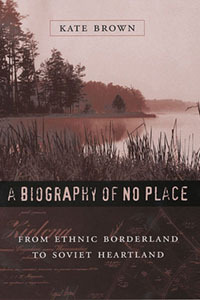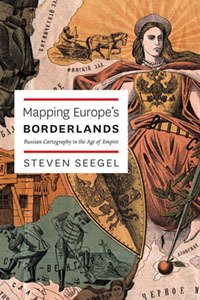This news feed is a platform for reliable information and resources on the Russian invasion of Ukraine, primarily that shared with the Nanovic Institute by its friends and colleagues in Ukraine. The Nanovic Institute has many close ties to Ukraine, particularly with the Ukrainian Catholic University (UCU) through our Catholic Universities Partnership. This news feed is one expression of our solitary and support.
This page will be updated regularly, with the most recent information posted at the top.
Statement by Notre Dame President
Rev. John I. Jenkins, C.S.C.
Statement by Scott Appleby,
Dean of the Keough School of Global Affairs
Resources from the Kroc Institute
ND + UCU | Solidarity with Ukraine
Books on Ukraine, Russia and their Shared History
“By removing the Russians from responsibility, the Europeans are doing them a disservice.” – Myroslav Marynovych
Source: Ukrainian Catholic University
Tuesday, March 14, 2023
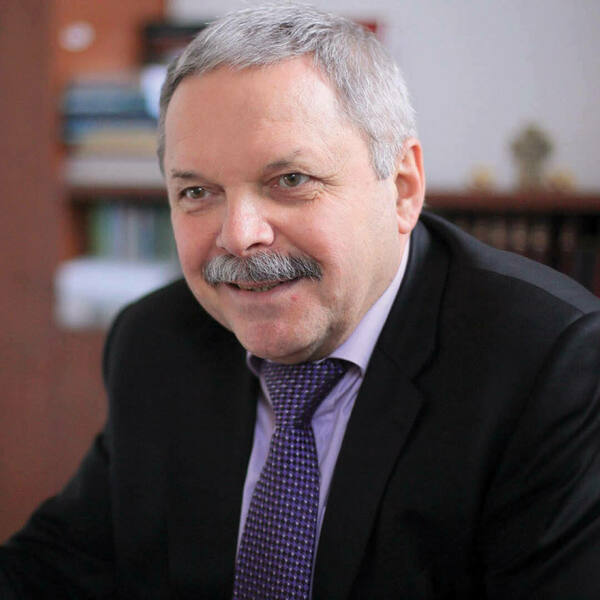
UCU vice-rector, founding member of the human rights organization Ukrainian Helsinki Group, former political prisoner and dissident Myroslav Marynovych took part in a session of the German Episcopal Conference held on 2 March in Dresden. In September 2021, Marynovych visited Notre Dame to deliver the Nanovic Forum lecture, hosted by the Nanovic Institute for European Studies.
First of all, I want to thank you for the invitation. It is an undoubted honor for me to speak to you.
I would like to make two introductory remarks:
Firstly, Germany, despite internal deterrents, has provided Ukraine with invaluable financial and military support, as well as accepted and warmed 1 million Ukrainian refugees. Our gratitude to the German people and to the German Churches, for this is enormous. Thank you very much for your Christian solidarity!
Secondly, I am sure you are well aware of the main outlines of Russia’s current war against Ukraine. Therefore, in the time allotted to me, I would rather talk about those aspects that attract less media attention. For example, I am truly surprised how the concepts familiar to humanity – like peace, negotiations, or reconciliation – acquire almost the opposite meaning in the curved mirrors of this war. One of the reasons for this is that the favorite method of Putin’s regime is the construction of lies around deep stereotypes rooted in basic cultural instincts.
Fr. Jenkins leads prayer service for peace in Ukraine
Source: Notre Dame News
Friday, February 24, 2023
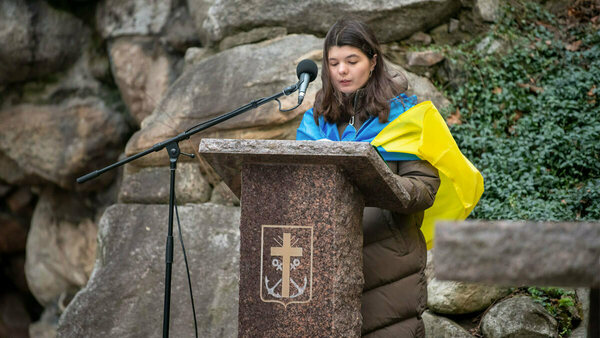
To mark the first anniversary of the Russian invasion of Ukraine, the University of Notre Dame’s president, Rev. John I. Jenkins, C.S.C., led a prayer service for peace on Thursday (Feb. 23) at the Grotto of Our Lady of Lourdes.
“We pray for the people of Ukraine … We pray for world leaders … We pray for the world that, in this moment of crisis, we may reach out in solidarity to our brothers and sisters in need,” Father Jenkins prayed to begin the service.
Yevdokiia Yevdokimova, a student from Ukrainian Catholic University (UCU) who is studying at Notre Dame this semester, followed by reading from chapter 41 in the Book of Isaiah, verses 1 and 4 to 13.
Father Jenkins then offered reflections on the war and God’s providence, focusing on verse 10:
“Do not fear: for I am with you;
do not be anxious: I am your God.
I will strengthen you, I will help you,
I will uphold you with my victorious right hand.”
“The words ‘Do not fear: for I am with you; do not be anxious, I am your God,’ mean as much today as they meant when they were written, nearly three millennia ago,” Father Jenkins said. “These are words of truth, hope, consolation.
“Today, these verses are being read in Ukrainian bomb shelters, in hospitals caring for the wounded, at funerals, at the front line, in the lecture halls of our sister institution, the Ukrainian Catholic University.”
He continued: “Let us at Notre Dame continue to stand in solidarity with all peace-loving people in praying for an end to this unjust war.
“Let us pray that peace, freedom and dignity will be enjoyed again by our sisters and brothers in Ukraine, and by all people.”
Between Lviv and Lublin: A friendship forged at Notre Dame has helped sustain a Ukrainian family in wartime
Source: Notre Dame Magazine
Friday, February 24, 2023
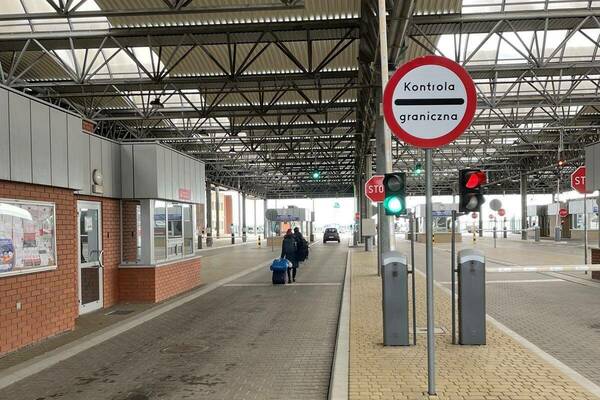
On the one-year anniversary of the Russian invasion of Ukraine, the Nanovic Institute is honored to share the story of two of our former visiting fellows. Svitlana Khyliuk, director of the Ukrainian Catholic University law school, and Magdalena Charzyńska-Wójcik, associate professor at John Paul II Catholic University in Lublin, met at Nanovic in the fall of 2021. Their home universities are both members of the Catholic Universities Partnership, an initiative led by the Nanovic Institute to foster mutual support, elevation, and development of Catholic higher education and civil society in post-communist and post-Soviet Europe.
Driving eastward in Ukraine, toward the air raid sirens that had started the day before, Svitlana Khyliuk made a call to Poland. On the other end, Magdalena Charzyńska-Wójcik listened as her friend retold the traumatic events of the past 24 hours.
At around 10 a.m. that morning, Khyliuk had walked with her two young children across Ukraine’s western border into Poland. They were fleeing the advancing Russian forces that launched a full-scale invasion of their homeland the previous day, February 24, 2022. An existential threat confronted her family. Khyliuk and her husband, Oleksiy, had to make a heart-wrenching decision.
The family’s journey to Poland was exhausting, terrifying and traumatic. What would typically be a one-hour drive took 14. They drove as far west as they could before hitting gridlock from mass movement toward the border. Oleksiy, who would not and could not leave his country when it was under siege, remained with their car, watching his wife, daughter and son set off on foot into the cold February night.
New Exhibition: "Ukrainian Art as Protest and Resilience"
Source: Nanovic Institute
Thursday, February 23, 2023
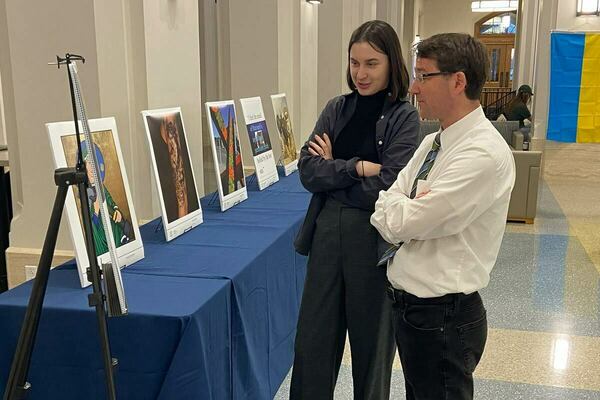
The Nanovic Institute for European Studies announces the opening of a new in-person and digital exhibition “Ukrainian Art as Protest and Resilience.” To coincide with the one-year anniversary of the Russian invasion of Ukraine, the Institute launched this exhibition, the outcome of an undergraduate research project, in the Forum, Nanovic Hall on Wednesday, February 22, 2022.
Over the winter break, ten undergraduate students led by Yaryna Pysko MGA ’24, researched various mediums of public art and their role in Ukraine’s struggle to defend its sovereignty. Their research has culminated in this exhibition, which samples the students’ chosen works that range from Ukrainian fashion to children’s art.
In a discussion of the project’s background, Abigail Lewis, postdoctoral research associate at the Nanovic Institute, writes: “This exhibition seeks to highlight Ukrainian protest and resilience during the invasion by Russia and how public art has become a medium of resistance, traumatic mediation, and expressions of identity. Faced with the threat of cultural annihilation, Ukrainian artists have brought Ukrainian identity, history, and culture to the fore.”
The in-person exhibition will be on display in the Nannovic Hall Forum until March 10, 2022. The digital exhibition is available at the link below.
Student researchers: Emma Ackerly ’23, Clare Barloon ’24, Peter Di Re ’23, Libby Eggemeier ’25, Michael Ellis ’24, Anna Gazewood ’24, Jacqueline McKenna ’23, Bella Mittleman ’24, Erin Tutau ’24, Felicity Wong ’24.
What’s Human about War?
By Anna Romandash ’22 MGA
Source: Notre Dame Magazine
Winter 2022-23 Edition
The answer comes uneasily during visits with Ukrainian women whose homes and loved ones are webbed into violence and pain and fortitude.
“I don’t know,” Valeriya sighs. “It’s a tough question.”
We’re sitting in a poorly lit kitchen as the sun says its final goodbyes for the day. Shadows grow longer as twilight sets in. I don’t think Valeriya notices that. She is still somewhere else, in her thoughts, trying to answer her own question.
“I genuinely wonder every day, you know,” she continues, looking at me. “What is it that makes you human? Is it enough to be born one to remain human throughout your life? That can’t be it.”
It’s July, so it is very warm, despite the late hour. I get up to make another cup of tea for both of us as Valeriya answers a phone call. It is her husband.
“He’s OK, but they had a few missiles coming in the central area,” Valeriya says melancholically. “He told me his colleague got killed.”
We don’t speak for a while. The kettle alone disturbs the silence. I am not sure whether to stay or go.
“You’re really too kind,” Valeriya suddenly says. “It is so sweet to check on me. With all that’s going on, I am sure there are lots of people who need help more than I do. And I do owe you my story, but I am just not sure it is any different from anybody else’s. I left, but my husband stayed. I hope he comes here, but I cannot be sure. He is stubborn, and I love him for it. But my kids are here now, and this is where I will be.
“But mentally, I am still there.” Her voice dies down.
Valeriya is from Mykolaiv in southern Ukraine. She is in her mid-50s, and she used to work as an accountant in a bank while her husband taught physics in high school. When Russia launched its full-scale invasion of Ukraine on February 24, 2022, Valeriya was in her cozy Mykolaiv apartment. She had just woken up, and she knew something terrible had happened.
Having Coffee With . . . Kristina Bohdanova: Ukraine and the quest for peace
Source: Notre Dame Magazine
Winter 2022-23 Edition
Editor’s Note: As part of her “Having Coffee With ...” series, Margaret Fosmoe ’85 sat down with Kristina Bohdanova, a medical doctor and a graduate student in clinical psychology at Ukrainian Catholic University. Bohdanova was one of 10 UCU female exchange students who studied at Notre Dame during the fall semester as part of a partnership between the two schools.
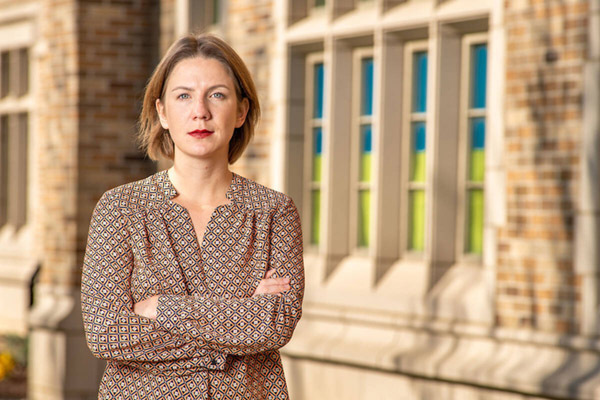
From half a world away, Kristina Bohdanova follows reports of missiles raining down on her native Ukraine, of torture and other human rights abuses, of Russian threats to use nuclear weapons. The news steels her in her work to help her countrymen vanquish the Russian invasion and rebuild their homeland.
Bohdanova, 30, is a medical doctor and a graduate student in clinical psychology at Ukrainian Catholic University. She’s one of 10 UCU female exchange students who studied at Notre Dame during the fall semester as part of a partnership between the two schools.
A physician since 2016 with a degree from Zaporizhzhia State Medical University, Bohdanova spent most of that year in the port city of Mariupol, working for a unit of Ukraine’s national guard that began fighting pro-Russian forces after Russia’s seizure of Crimea.
When she completes her master’s degree this year, she intends to become a practicing clinical psychologist. Needs will be great in war-torn Ukraine, and she is determined to use her training to help her people overcome war’s devastation and prepare for the nation’s future.
But I Go On
by Anna Romandash ‘22 MGA
Source: Notre Dame Magazine
Sunday, January 1, 2022
Notre Dame Magazine Editor’s Note: The new year dawned amid more destruction in Ukraine. Anna Romandash, a Ukrainian journalist and recent graduate of the Keough School of Global Affairs, offers this dispatch about her home country’s resilience, echoing her story in our winter issue.
In Ukraine, the people fight to repel an invader, resisting not only the physical devastation but the emotional paralysis that threatens a population under siege.
It’s January 1st, New Year’s Day. I went to bed around 11 p.m. on December 31 and did not wake up for the midnight countdown. I slept through an air alert and 45 missiles and drones that Russia launched against my country in the first hours of 2023. I learned about the attack only after waking up.
A day earlier, on December 31, we had an air alert for about four hours. Russians launched missiles and drones again, targeting anything they could target. In the past, they used to strike electricity grids and other critical infrastructure. Now, as Ukrainians learned how to counter missiles more or less effectively, Russians are attacking whatever they can in hopes of causing most destruction. At least two people were killed, and a few dozen are injured. That’s how Ukraine enters 2023.
As I wake up to the new year, I read my friend’s tweet.
“Department for infants of the Kherson Regional Children’s Hospital. The hospital where my mother works. A few minutes before the New Year, Russians started shelling it. Nurses saved the children, no one was injured. Almost all other buildings are damaged. Russian army is sick.”
The tweet includes four pictures of destruction. Rubble and trash in what used to be a hospital hours ago.
I look at the images, and I suddenly feel very tired. My husband calls it emotional paralysis.
Ukrainian Catholic University receives presidential award for volunteer activity
By Matthew Matuszak
Source: UCU
Thursday, December 15, 2022
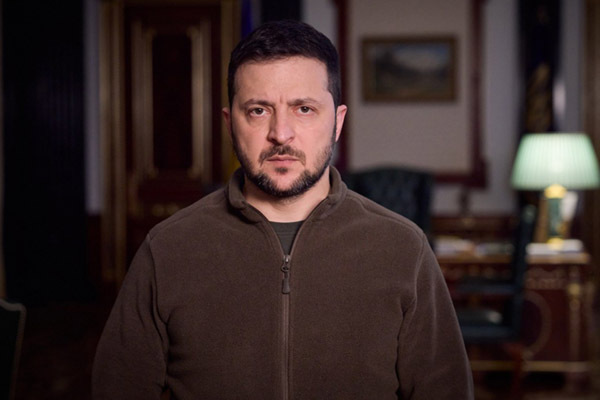
Ukrainian Catholic University is among 50 volunteer groups whose representatives are receiving this year’s award for volunteer activity from Ukrainian President Volodymyr Zelenskyy.
“This is a heart, a golden heart for ordinary people who defend us all… People should know who is involved in helping Ukraine. People should know whose hearts give us such results, for which Ukrainians are grateful,” stated Volodymyr Zelenskyy.
In his address on Volunteers’ Day, the president emphasized: “Today volunteers are the most powerful part of Ukraine’s civil society. This is a movement which unites all cities and communities of our country and all social groups. And this is an idea which involves millions of people from various countries of the world in the Ukrainian fight for freedom.
Ukrainians are changing the world!
Source: UCU
Monday, December 5, 2022
How did Ukrainian Catholic University get through this most difficult academic year under the conditions of a full-scale invasion? We didn’t stop instruction for even a moment. Daily the UCU Volunteer Center helps those in need! We’re working and doing everything possible for Ukraine to win this war, and we’re preparing future leaders who’ll be able to take an active part in rebuilding our country. This is a painful experience, but a critical time for the country, and our students and professors are pro-actively helping people.
“Learn, and then share the acquired knowledge for the good of Ukraine. We will win this fight!” So our students who are now on the frontlines encourage us. “We need to be together. Together we must fight for victory. Together we must witness. Together we will overcome everything.” UCU Rector Fr. Bohdan Prach
Watch a short film about UCU’s life and work under the conditions of a full-scale war.
UCU’s Emmaus Center: A Beautiful #GivingTuesday Story
By Larissa Nycz Montecuollo
Source: UCU
Thursday, November 17, 2022
This Giving Tuesday, UCU is highlighting their Emmaus Center, a place where people with developmental disabilities and their families receive spiritual support and share their lives with students.
Through The Emmaus Center, UCU is addressing the circumstances of the disabled after years of Soviet dehumanization. Disabled persons are welcomed with dignity and as an integral part of the UCU campus. “They live in the dormitories, they help in the cafeteria. They helped in my office when I was a rector and president of the university,” said Archbishop Borys Gudziak. “They are part of our community and I think it’s the first university in history that has placed the mentally handicapped at the heart of the identity of the university. Not as a social project, but at the heart of the identity.”
War and Ukrainian identity through the eyes of a Ukrainian graduate student
Source: Europe in the World
Tuesday, November 15, 2022
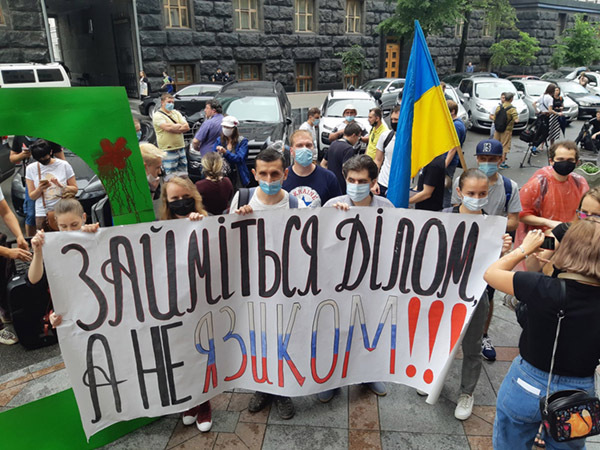
In a post for https://eitw.nd.edu/Europe in the World, Nanovic Institute Graduate Fellow Joseph Clarkson, a doctoral candidate in the department of political science at the University of Notre Dame, interviews Ukrainian graduate student Oleksandr Pometun about his perspective on the ongoing Russo-Ukrainian War. Clarkson and Pometun first met in 2018 while studying German at the Technische Universität in Dresden and have maintained a close friendship ever since. Pometun is originally from Dnipro, Ukraine, where he graduated from Dnipro National University in 2021. He is now a student of Cognitive Science at the University of Osnabrück, Germany. Here, he reflects on the experience of the war and its broader significance.
“Leadership and global solidarity in a time of war” by Halyna Protsyk
Source: Crossing the Square
Thursday, October 20, 2022
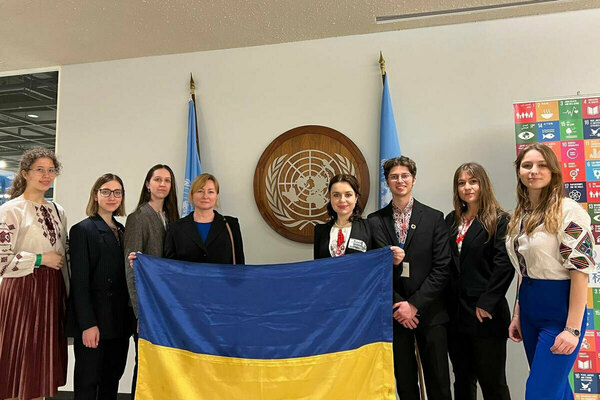
Halyna Protsyk is the director of the International Academic Relations Office and a lecturer in the Department of Political Science at the https://ucu.edu.ua/en/https://ucu.edu.ua/en/, Lviv. She is also a trainer for the Ukrainian student delegation to the National Model United Nations (New York, USA). Protsyk participated in the Catholic Leadership Program at Notre Dame in 2017 and in the Advanced Leadership Program in Rome in 2022, initiatives of the Catholic Universities Partnership that are facilitated by the Nanovic Institute for European Studies.
“We know ourselves only as far as we’ve been tested.” Most recognize this line from a poem by Polish Nobel laureate Wislawa Szymborska. It is difficult to imagine a more serious test of leadership and solidarity than war, and all the horrors and suffering that accompany it. War sharpens and brings into focus the entire value and ethics systems that a person cultivates throughout their life. In war there are only two options — either you call evil as evil and persistently fight against it, enforcing your victory in the right to remain a human and a Christian, or you try to look for a compromise with evil, eventually losing yourself and being defeated.
This is my personal lesson. Living in a country where a cruel and unjust war has been going on for seven months has taught me that there is no third way. Instead, this life experience has shown me how important it is to not let go of God’s hand, to understand yourself, your inner, God-given strength, your community, and the values that underpin the bonds you share with your family, colleagues, and community both at home and around the world. In scenarios like this, the Catholic Leadership Programs, facilitated by the Nanovic Institute as part of the Catholic Universities Partnership, not only prepared me to test my own leadership in the context of wartime uncertainty but also empowered me and my team to activate our strengths even when the situation has seemed to be hopeless.
Byzantine Catholic mass for peace in Ukraine at the University of Notre Dame
Source: Ukrainian Society of Notre Dame
Wednesday, October 19, 2022
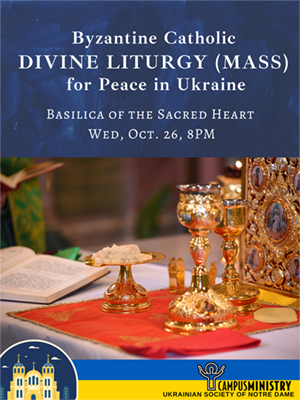
Join the University of Notre Dame’s Campus Ministry and the Ukrainian Society of Notre Dame for a Byzantine Catholic celebration of the divine liturgy (mass) for peace in Ukraine. This will take place in the Basilica of the Sacred Heart at 9 p.m. on Wednesday, October 26, 2022.
“Ukrainian independence and resilience in the shadow of war” by Sophia Opatska, UCU
Source: Crossing the Square
Thursday, October 6, 2022
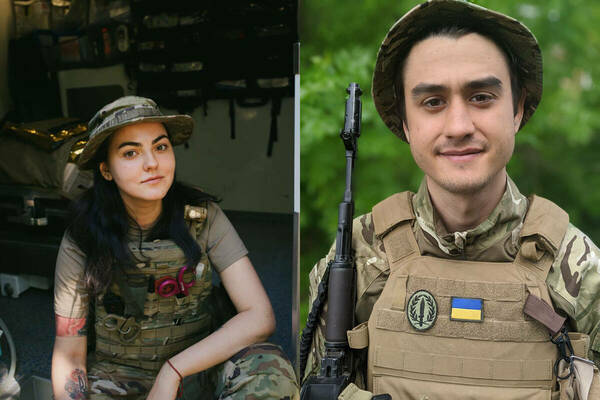
Sophia Opatska is vice-rector for strategic development at the Ukrainian Catholic University in Lviv and the founding dean and chair of the Supervisory Board of Lviv Business school, also at UCU. Opatska was a visiting scholar at the Nanovic Institute for European Studies in 2017-2018 and a participant in the Advanced Leadership Program in Rome in 2022, an initiative of the Catholic Universities Partnership.
On August 24, 2022, Ukraine celebrated the 31st anniversary of its independence following the collapse of the Soviet Union in 1991. Indeed, Ukraine’s Declaration of Independence was part of the reason the USSR fell. When I am abroad — as one of five million Ukrainian refugees or, as some Europeans call us, “unfortunate tourists” — I have an app on my phone that sends push notifications when the air raid siren sounds in Ukraine, specifically in the Lviv region where my husband, son, and parents are living. On Ukrainian Independence Day, I received no less than 14 push notifications over 12 hours, beginning at 6:54 a.m. and ending at 20:30 p.m. At some point after leaving Ukraine in March, I inevitably turned off the sound. I remember doing this one night after we had arrived in Poland and the alarm had woken my younger kids. Can you imagine going through this seven times per day: hearing an alarm that signals an imminent threat to your life and forces you to take shelter, including on one of the most important days for your entire country? Imagine if instead of celebrating with fireworks on July 4, Americans were forced to hide in bomb shelters several times.
At the end of May, my colleagues at the School of Public Management at Ukrainian Catholic University (UCU) calculated how much time Ukrainians had spent in shelters, in response to air raid sirens, in the three months between February 24 (the day of Russia’s invasion) and May 24. The now-occupied Luhansk region held the record with 53 days and 16 hours. This was followed by the Kharkiv region, where citizens have been under constant shelling from short distances and have spent 19 days and 17 hours in shelters, then Chernihiv region (16 days and 1 hour), the city of Kyiv (15 days and 13 hours), and Zhytomyr region (14 days and 16 hours). These figures are shocking, even without going deeper into the consequences of constant aerial bombardment: the human lives lost, the psychological damage inflicted upon the people who go through this madness, and the damage to infrastructure, including crucial social infrastructure.
When I started to think about this blog on resilience it became clear to me that I needed to read some articles on the topic. This was partly because it was a buzzword that I had never used before the coronavirus hit the world, but it was also because I realized that so much had happened to me, to my university, and to my nation in the previous six months and I needed a way to sort through this experience and reflect. I realized that the concept of resilience might be helpful to calm the chaos in which we have been operating and bring some perspective.
New research grants announced through Notre Dame’s partnership with Ukrainian Catholic University
Source: Notre Dame News
Thursday, September 29, 2022
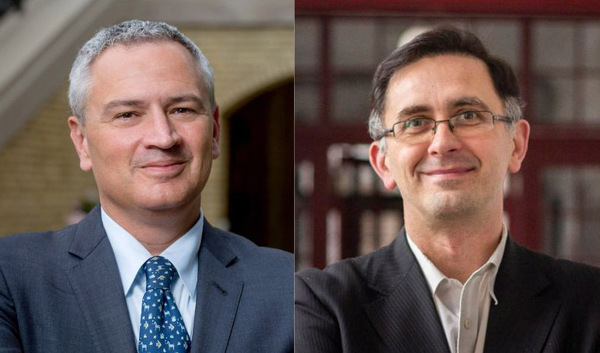
The University of Notre Dame and https://ucu.edu.ua/en/Ukrainian Catholic University (UCU) are launching three collaborative grants that expand the existing academic, religious, and cultural partnerships between the two universities. The collaborative projects include the ND-UCU Faculty Collaboration Grant Program, the ND-UCU Curriculum/Course Development Grants, and the ND-UCU Library Guest Scholars Program.
The ND-UCU Faculty Collaboration Research Program, which is now accepting applications, is focused on the following themes informed by Russia’s invasion of Ukraine: war and resilience, religious dimension, moral and legal responsibility, and integral human development and sustainable reconstruction.
“These collaborative grants will provide faculty members the opportunity to pursue research that will have tremendous influence in a variety of scholarly disciplines and for Ukraine in the months and years to come,” says Michael Pippenger, Notre Dame’s Vice President and Associate Provost for Internationalization.
“Being able to support Notre Dame and UCU faculty to pursue academic inquiry without pause and empower formative research during a time of war exemplifies what it means to be in solidarity together for the common good.”
The Gist: War Torn
Source: Margaret Fosmoe, Notre Dame Magazine
Wednesday, September 28, 2022
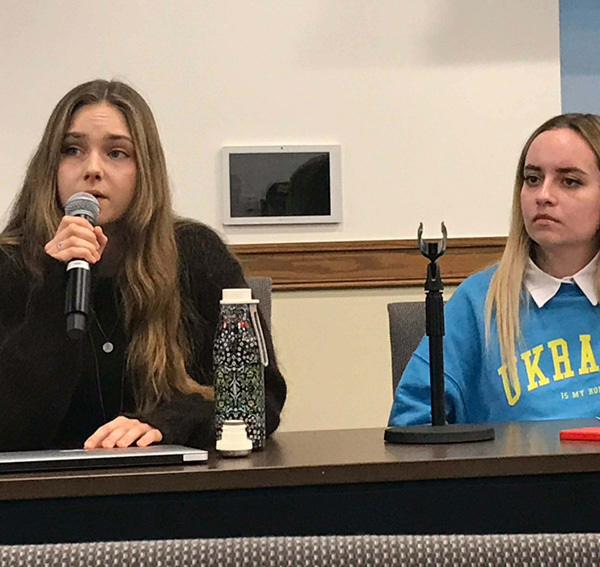
The world is watching what is happening in Ukraine: bombed cities, thousands killed and maimed, orphaned children, reports of torture by Russian troops and Russian President Vladimir Putin threating to use nuclear weapons.
Ukrainians have witnessed such scenes first hand. With the war against Russian invaders raging in their home country, 10 Ukrainian women are attending Notre Dame this semester as exchange students.
Their presence is part of an expansion of Notre Dame’s partnership with Ukrainian Catholic University in Lviv, a city near Ukraine’s western border.
During a September 22 panel discussion on campus, five UCU students spoke about the war and its impact on their lives and families. They described fears and challenges they have faced since February 24, when Russia invaded their country in a major escalation of the Russo-Ukrainian War that began in 2014.
The discussion was moderated by Clemens Sedmak, director of the Nanovic Institute for European Studies.
Selection from panelist:
Olena Tsyhankova, UCU undergraduate
After the invasion, she, her mother and younger brother walked 15 hours in the winter cold to reach the Polish border. They traveled on to Spain to live with her godmother. She said fear and anxiety have been constant feelings.
“Every Sunday there were demonstrations (in the Spanish village), where Ukrainians were trying to spread awareness about the war.” Many participants were Ukrainian women and children forced to flee from central and eastern Ukraine. “The traces of terror and pain and grief was reflected in their eyes and the women’s faces.”
“I do still feel guilty and as if I’m not doing enough, but I’m very happy that I was there for my family and that I’m here right now as well. Perhaps that was and still is my role in this event.”
Read more selections from panelists
Rev. Prof. Daniel Groody on threats to freedom in Ukraine
Source: UCU
Monday, August 22, 2022
“The threats to freedom in Ukraine are threats to freedom everywhere” – Rev. Prof. Daniel Groody, Vice President of the University of Notre Dame
For six months, Ukraine has heroically been fighting for freedom, not only for its own country but for the whole world. Hundreds of charitable organizations, businesses, and millions of ordinary people have provided financial and prayerful support for Ukraine. The world’s academic community expresses its solidarity with the Ukrainian people and continues to help students who were forced to leave the territory of Ukraine as a consequence of the war with Russia.
At the start of the war, UCU’s partner of many years, the University of Notre Dame in the USA, initiated the spread of cooperation among universities, amounting to 2 million dollars in the first year. Students of UCU’s bachelor’s and master’s programs received the opportunity to study at Notre Dame, and UCU doctoral students had the opportunity to apply to study in one of five global branches of Notre Dame: in Peking, Dublin, Jerusalem, London, and Rome.
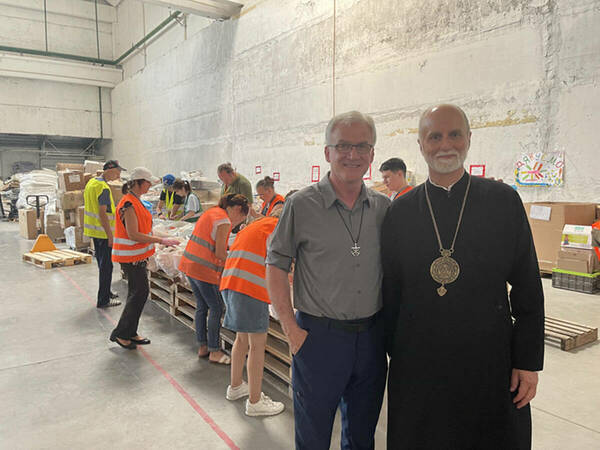
Recently Rev. Prof. Daniel Groody of the University of Notre Dame, Associate Professor of Theology and Global Affairs and Vice President and Associate Provost for Undergraduate Affairs, visited Ukraine. Together with Archbishop Borys Gudziak, Metropolitan of the Philadelphia Archeparchy of the UGCC in the USA, he visited Ukrainian Catholic University, the Center of Volunteering and Defense, and Wings of Hope charitable foundation and met with wounded soldiers who are being treated at the hospital, and he also visited a modular city for internally displaced persons.
In this short interview with Rev. Prof. Daniel Groody, you can read why the war in Ukraine involves the whole world, whether it is important to provide support to the Ukrainian people, and why education is important for restoring peace in the world.
Recommended list of books and films about Ukraine in Foreign Languages
Source: UCU
Thursday, August 18, 2022
“We often speak with colleagues from universities from all over the world and always people want to help in some way Ukraine and we value it very much. Bigger and smaller acts of solidarity help and keep our morale in such difficult times as war. A step which every University globally can do for the benefit of Ukraine and themselves is to buy a smaller or bigger collection of books on Ukrainian history, culture, literature (one which does not have a russian narrative) and have a collection of Ukrainian movies in the libraries. Ukrainian Catholic University, UCU library has put the list advising books and movies about Ukraine in foreign languages,”
— Sophia Opatska, Founding Dean and Chairman of the Supervisory Board of Lviv Business School at the UCU, Vice Rector for implementation of UCU.
Interest in Ukraine in the world has wave-like tendencies. And, unfortunately, it mostly coincides with turning points (Orange Revolution, Revolution of Dignity) or periods of great trials (2014 – … russian-Ukrainian war (annexation of Crimea, occupation of parts of Donetsk and Luhansk regions; 24.02.2022 – … full-scale invasion of the russian federation in Ukraine)). At such times, topics about Ukraine are often covered on the front pages of newspapers/magazines, they are the top topics of television news and other media resources. In addition to live monitoring of the course of events in Ukraine, foreigners are interested in the reasons for these events, why they are happening in Ukraine, where this Ukraine is on the world map, and what is so special about it. The answer to these questions requires immersion in the layer of books and films (fiction, popular science, science) written/translated about Ukraine by Ukrainian and foreign authors.
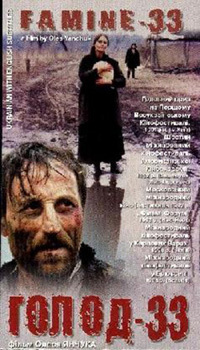
Such lists of “books to read about Ukraine” already exist, such as the list of The New York Public Library.
Forming our own list of “books and films to read/watch about Ukraine”, we did not aim to answer all possible questions that a foreigner might have about Ukrainians. However, we intended to interest, to encourage a deeper study of the history/culture/literature of an independent, sovereign state and to emphasize that Ukraine, despite a number of problems it is struggling with, should not be associated only with the “post-soviet space” and be one of the unknown states in Eastern Europe in the neighborhood of the EU.
Books published by HURI (Harvard Ukrainian Research Institute) also deserve special attention.
Therefore, we encourage you to discover Ukraine through this list of books and films (which, of course, does not claim to be exhaustive) and to distribute it to an interested English-speaking audience.
Notre Dame President Rev. John I. Jenkins, C.S.C., on Russian atrocities against clergy in Ukraine
Source: University of Notre Dame
Monday, August 15, 2022
“Media outlets recently have reported on the latest Russian outrages against Ukraine in the form of imprisonment, torture and murder of Catholic priests and clergy of other denominations in occupied portions of Ukraine. One priest wearing a cassock was pulled from a car at a Russian checkpoint and summarily shot to death. Other clergy have been tortured for refusing to cooperate with the Russian military in turning their congregations against Ukrainian authorities.
“The University of Notre Dame enjoys a special relationship with Ukrainian Catholic University in Lviv, and its president, Archbishop Borys Gudziak, who was our commencement speaker in May. He and many others have courageously spoken out against the Russian war. We stand united with the clergy who have historically and bravely resisted the manipulation of their faith — first perpetrated by the Soviet Union, later by Russia and its puppet government in Kyiv, and now during this most brutal attack on clergy and the Ukrainian people at large.
“I offer my prayers today for all of Ukraine, and especially its churches and clergy, and ask that the Notre Dame community and everyone who values freedom to worship to do the same. Let us stand with people of faith as they resist such inhumane aggression.”
Practicing Resilience: UCU students take part in international summer school in Croatia
Source: UCU
Thursday, August 11, 2022
A summer school called Practicing Resilience. Preparing for Recovery was held in Dubrovnik, Croatia, as part of a partnership of UCU, the University of Notre Dame (USA), and the Catholic University of Croatia. For two weeks, 20 students of Ukrainian Catholic University developed projects focusing on the recovery of Ukraine after the war. The initiative of holding the summer school arose as part of the Catholic Universities Partnership and was organized by the Nanovic Institute for European Studies (University of Notre Dame), the Catholic University of Croatia, and Ukrainian Catholic University.
There were 35 students at the school, from Croatia, Poland, Slovakia and Georgia. Experts from the USA, Belgium, Croatia and Italy taught at the school.
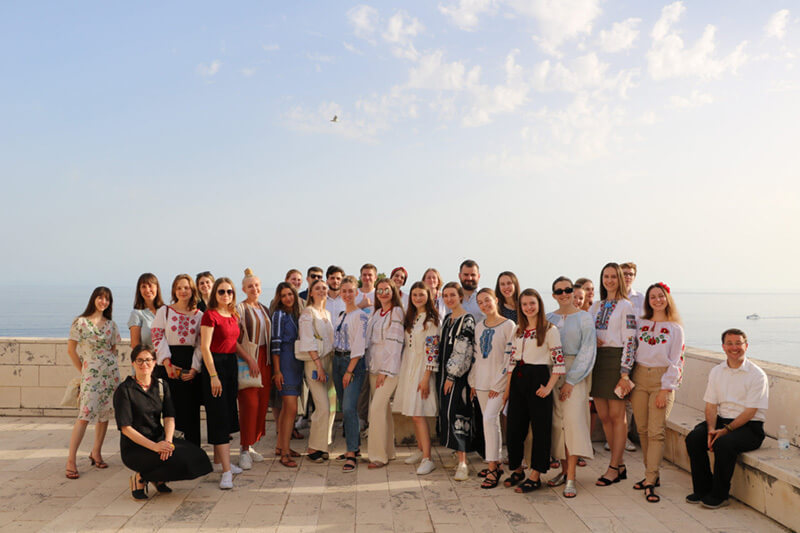
The main idea of the school, Practicing Resilience. Preparing for Recovery, is to create an international forum for cooperation and initiatives of students of Catholic universities not only on the administrative but also on the community and personal levels. Study in a peaceful environment, together with the experience of war, can become the most successful combination for thorough development of concepts for postwar recovery, said the organizers of the initiative. Also, the mission of the summer school aimed at the integrated development of participants and fostering a spirit of community and solidarity.
“The theme of the school was born from the current geopolitical situation which we are now experiencing, this is vitality, future recovery. We also focused the main accents around the situation in Ukraine. During the lectures, practical assignments and master-classes, we discussed psychological aspects and social dimensions of resilience, on the individual, community and institutional levels. The lecturers centered their talks on social sciences: sociology, culture studies, psychology, and the communication of trauma, and also a strong theological element, study of how faith becomes a resource for resilience in moments of crisis,” explained the coordinator of the project from UCU, Nataliya Yakymets, assistant director of academic questions of UCU’s International Institute for Ethics and Contemporary Issues.
Happy Independence Day
Source: UCU
Monday, July 4, 2022
Archbishop Borys Gudziak, Archbishop-Metropolitan for Ukrainian Catholic Archeparchy of Philadelphia and president of Ukrainian Catholic University delivered a message to celebrate U.S. Independence Day in Ukraine with UCU's American friends Rev. Daniel Groody, associate professor of theology and global affairs, vice president and associate provost for undergraduate affairs at the University of Notre Dame and Ben Wortham, vice president of Behavioral health integration, Catholic Charities, USA.
Gudziak notes: “We would like to thank all Americans for their support. Everywhere we go in Ukraine, people express their gratitude: for your prayers, for being informed, and for the incredible humanitarian aid. You are bringing American freedom to the world. America has been a model for Ukrainians for centuries. Today Ukraine becomes a model for Americans.”
Delegation from Catholic University of Lublin headed by Rector Fr. Mirosław Kalinowski Visits UCU
Source: UCU
Wednesday, June 15, 2022
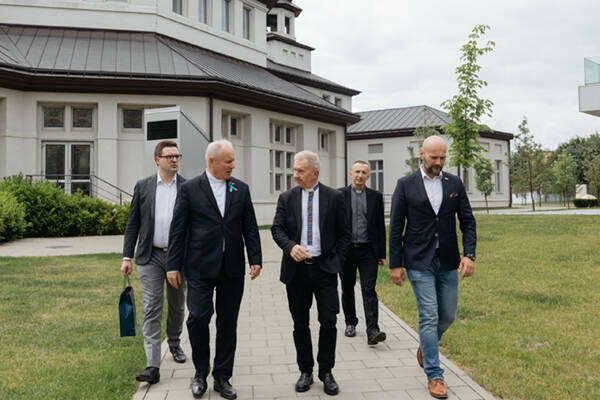
On 15 June, a delegation from the John Paul II Catholic University of Lublin (KUL) in Poland, headed by Fr. Rector Mirosław Kalinowski, visited the Ukrainian Catholic University.
They visited the Ukrainian Catholic University campus and UCU Sheptytsky Center, where the volunteer center is located, and also the University Church of the Holy Wisdom of God.
In the words of UCU Rector Fr. Bohdan Prach, it was a friendly visit: “Our Polish colleagues assured us of their readiness to help Ukraine and our university in this difficult time. In particular, there was talk of helping those students, professors, and staff who are now on Polish territory because of the war.”
Why is it important to qualify atrocities committed by Russian as genocide?
Source: UCU
Tuesday, June 7, 2022
Svitlana Khyliuk is the Head of the UCU Law School, and associate professor of theory of law in the Human Rights Department, at Ukrainian Catholic University. She delivered this lecture at the Advanced Leadership Program, organized by the Nanovic Institute for European Studies and hosted by the Notre Dame Rome Global Gateway, as part of the Catholic Universities Partnership.
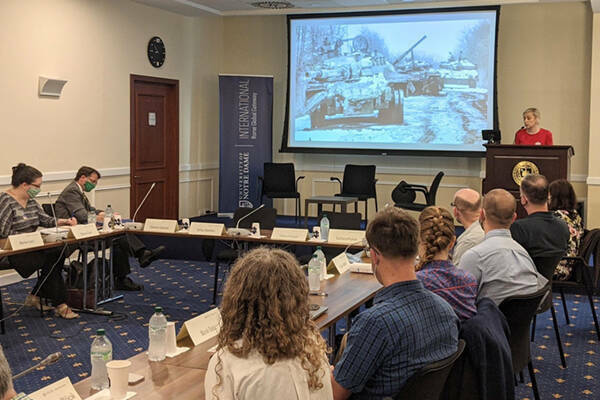
Legal assessment of Russian atrocities as a genocide will not help those who have been already killed, but it may help to save other lives in order to make never again real again.
It is my honour and pleasure to be here today. I’m grateful to the Nanovic Institute for this an opportunity. Also, I’m also grateful that despite the tight schedule of the Leadership program you found a time slot to address Ukrainian context, by which we understand Russian full-scale unprovoked invasion of Ukraine
I’m from Ukraine. These words did not mean much three months ago. But now being from Ukraine means readiness to fight for freedom and dignity no matter what it will take, ability to survive and remain humane in any circumstances. Ukrainian resistance to Russian aggression makes Ukraine, its strength, its authenticity visible for the world. We are paying huge price for this and we are going to win. The victory it this war has many different dimensions, each of them will have huge implication for the future of Ukraine, of Europe and I dare to say for the whole world.
I’m a lawyer. For me victory includes a proper legal assessment of all what happened during the conflict. So, to win means also to call what have happened by its name and to punish the guilty persons.
Why are UCU students and staff coming back to Lviv? — CNN reports
Source: UCU/CNN
Tuesday, May 18, 2022
CNN spoke with Ukrainian Catholic University students, faculty, and staff about how the war has affected their lives, why they went abroad, and most importantly, why they returned home.
A Ukrainian academic on sabbatical experiences solidarity at Notre Dame
Source: National Catholic Reporter
Monday, May 17, 2022
Taras Dobko, associate professor of philosophy and senior vice-rector at the Ukrainian Catholic University in Lviv, is a visiting fellow at the Nanovic Institute for European Studies. He wrote this article for the National Catholic Reporter.
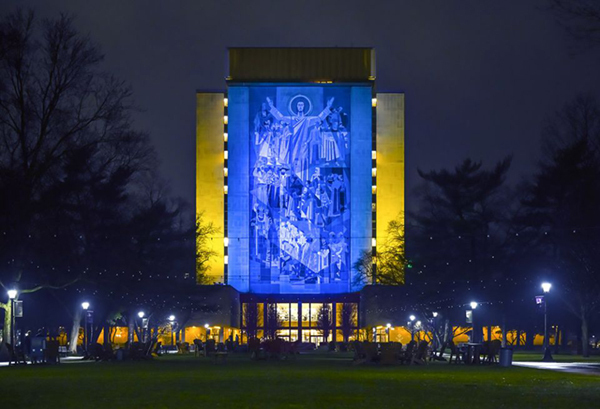
It is early March, and I am walking through Georgetown in Washington, D.C. I come across a campus of the Georgetown Visitation Preparatory School. I read the plate about its foundation in 1799 and its uninterrupted history for two centuries. Suddenly it occurs to me: I wish I could remember a single institution of learning in Ukraine that could enjoy at least 50 years of existence without any major disruption.
I couldn’t.
When Ukrainians hear about institutions celebrating centennials of their unbroken operation, we can hardly imagine what it is like. In Ukraine it is nothing short of a miracle. As soon as Ukraine grows a new generation of professionals — in business, engineering, arts, the church, in education — it is attacked by some imperial power looking to uproot my country’s vitality. Then we must begin from scratch, again and again.
Archbishop Borys Gudziak: 2022 Commencement Address
Source: University of Notre Dame
Monday, May 17, 2022
Standing in solidarity: Notre Dame expands partnership with Ukrainian Catholic University
Source: University of Notre Dame
Friday, May 13, 2022
University of Notre Dame President Rev. John I. Jenkins, C.S.C., and Metropolitan-Archbishop Borys Gudziak, organizer and president of Ukrainian Catholic University (UCU), entered into an agreement today to significantly expand the existing academic, religious and cultural partnerships between the two universities. The enhancements come in advance of Notre Dame conferring an honorary degree on the archbishop Sunday in its 177th University Commencement Ceremony, where he will also serve as the principal commencement speaker.
“The war in Ukraine is a great global tragedy,” Father Jenkins said. “We stand in solidarity with the courageous people of Ukraine and with our longtime partners at UCU. Notre Dame has for many years, through its Nanovic Institute for European Studies, hosted visiting scholars from UCU here on campus, and in turn our scholars have spent time there.
“Now, as the Ukrainians resist the Russian invasion of their country, the role of UCU and of all Ukrainian universities has never been more important, both in sustaining the work of Ukrainian scholars and researchers and in preparing for the eventual rebuilding of their war-ravaged nation. In dialogue with our colleagues at UCU, we have arrived at a set of initiatives aimed at providing substantive support and deepening our partnership through a wide range of collaborative initiatives.”
Virtual panel discussion: Legal Challenges Posed by the Large-Scale Russian Invasion of Ukraine
Source: Notre Dame Law School
Tuesday, May 3, 2022
Russia’s invasion of Ukraine has caused tremendous human suffering, dislocation, and economic devastation. It is no exaggeration to say the invasion has created the largest humanitarian crisis in Europe since World War II. While the invasion is still ongoing and its outcome is far from certain, it has already created numerous political and legal questions that demand reflection. What, if anything, can the law do to stop the conflict, provide just redress to the victims, and prevent future invasions like this in the future? Does the invasion undermine our belief in the international order and institutions called upon to maintain it? What could we learn at this point about the challenges posed by the invasion, and is reform of global security infrastructure possible, or even needed?
Join the Ukrainian Catholic University and the University of Notre Dame for a set of panel discussions on the legal challenges posed by the 2022 Russian invasion of Ukraine. These discussions are intended to bring together legal scholars from within Ukraine and from abroad in an attempt to map such challenges and articulate the possible pathways to their resolution.
Register on Zoom | More information
Archbishop Borys Gudziak in USA Today
Source: Matthew Matuszak, UCU
Wednesday, April 13, 2022
Earlier this week Rev. Borys Gudziak, Archbishop-Metropolitan and President of Ukrainian Catholic University, shared this opinion article in USA Today. We share this moving Holy Week message with you in its entirety. This Easter, we pray for all those who are suffering in this unjust war, and those who defend Ukraine bravely. We will defeat evil with good and will stand with Ukraine, now and in the future. May the miracle of our Savior’s Resurrection give us all strength during this difficult time. Christ is Risen! Христос Воскрес!
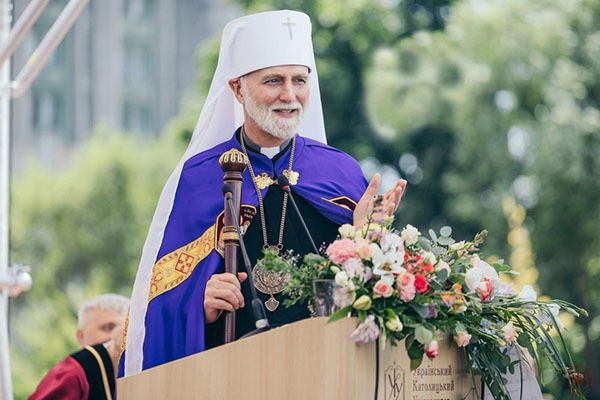
We can bring healing amid war in Ukraine, even as genocides past and present haunt us
The mass atrocities in Bucha vividly demonstrate a method of war conducted through murder. The crimes of the Russian invaders are already being compared with the craven cruelty of the Islamic State group. The scenes of brutality have broken our hearts and left many feeling helpless in the face of evil.
During Holy Week, Christians will be contemplating the great mystery of evil as reflected in mass graves, drawing hope from the empty tomb of Easter. Besides prayer, can we somehow contribute to the righting of these wrongs?
There is at least one thing all people of goodwill can do to bring healing in the midst of horror: We can welcome displaced Ukrainians and offer them safe haven.
I have witnessed this transforming compassion in the life of my family. Like millions of Americans, I am the son of refugees. My parents met at St. George’s Church on the lower east side of Manhattan in 1950. As 18-year-olds, they left Ukraine in 1944 as Nazi and Soviet invasions ravaged their homeland forever changing their hometowns. They arrived in America in 1949 and 1950 after years as refugees in Austria and Germany.
My father escaped alone. My mother’s parents left with two teenage daughters. My grandmother died at 45 in a camp in Austria in 1944. A third daughter who joined the Ukrainian resistance movement was killed by the Soviets in 1945 before the war ended.
Refugees flee, not to improve their lives, but to save them.
The last living representative of that quest for safety is my 93-year-old Aunt Stephanie, who lives in Queens. I have visited her regularly since I returned to the U.S. after 32 years of service in Europe. She is housebound and feeble. Throughout her life, she was a worker, not a complainer.
Now, when I visit, she recounts the terror of childhood – at 10, during the first Soviet occupation of western Ukraine, she was scarred by surrounding arrests, deportations and mass executions; at 12, she carried pails of water to help relatives wash and recognize the decomposing bodies piled up in torture chambers. Among the 6.8 million inhabitants of Ukrainian lands killed during World War II were 1.5 million Jewish victims, including Stephanie’s neighbors and classmates.
These stories of genocide, separation and exile still haunt Aunt Stephanie. Because they are happening in Ukraine today to people who became my family through my ministry there, they continue to haunt me.
Without aid, millions would be doomed
How long the Russian invasion in Ukraine will last cannot be foreseen. Thousands of combatants and civilians are killed daily. Already, 4 million refugees and 7 million internally displaced persons are marked by the trauma of leaving home to escape violence. Since about 90% are women and children, the recurring nightmares will include separation from husbands and fathers.
Another 12 million are home in Ukraine but helpless. Many lack food, electricity or clean water. Without humanitarian aid and spiritual support, they are doomed.
In the midst of suffering, however, has come moral clarity. Billions have seen not just a violation of sovereignty, but crimes against humanity. They have decided who is just and joined communal efforts to help.
There are heroic signs of fellowship in Ukraine, where citizens in the western part have embraced, housed and fed the IDPs from the east. In inspiring solidarity, Poland has already hosted 2.5 million refugees, Romania has hosted more than 600,000, and small countries Americans struggle to find on a map – Slovakia, Hungary and Moldova – together accepted more than 1 million. Other European countries and citizens have opened their borders and homes, too.
The United States made its first policy step to welcome 100,000 Ukrainians and others seeking refuge. I know the U.S. will embrace them. For the past month, our chancery has received countless calls from Americans ready to house and sustain those in need. We and other leaders in the Ukrainian-American community have joined the U.S. resettlement coalition Welcome.US. Together we are ready to mobilize at least 100,000 Americans to host, sponsor and support Ukrainians seeking refuge here.
Most displaced Ukrainians fervently want to return home. They call their husbands and fathers, grandparents and neighbors to confirm they are still alive. They are glued to the news and social media to see if their houses in Irpin, Bucha, Mariupol, Chernihiv and Kharkiv still stand. They want to rebuild what was destroyed. The valiant defenders of the innocent manifesting the greatest love, sacrificing one’s life for one’s friends (John 15:13) are doing everything to make this possible.
Welcoming displaced Ukrainians and providing them refuge requires the common effort of the global community. Ukraine needs assistance in reestablishing its sovereignty, territorial integrity and peace.
A belief in God-given human dignity asks every one of us to do our part, starting with an act of welcome. As in the past, Americans will rise to the occasion. Aunt Stephanie is a witness to the transforming compassion of this country then and, I hope, now.
Myroslav Marynovych on CNN—Why they fight: Ukrainians still remember past Russian oppression
Source: UCU
Wednesday, April 13, 2022
CNN’s Jake Tapper interviews Myroslav Marynovych Vice-Rector of Ukrainian Catholic University about Ukraine's painful history of oppression by the Soviet Union and its impact on their fight today.
“The people of Ukraine, they don’t have to imagine what life would be like under Russian rule, the oppression, the cruelty. They have already lived it. I am absolutely sure that Ukraine will win this war, because we understand the danger that may happen with us if Putin wins.”—Myroslav Marynovych.
UCU Student Stories
Source: UCU
Wednesday, April 13, 2022
The Dean’s Office for Student Life of Ukrainian Catholic University has collected students’ stories from various parts of Ukraine, where each person shares what he or she is doing to bring the country closer to victory. Here are a few moving stories:
“I believe that even the small efforts of each person accomplish something big!”—Sophia, 2nd-year student, UCU Social Work Program
I’m volunteering in my town: I help refugees find lodging, I prepare food… I also volunteer online: I’m helping add to a database of volunteers for work with children. I communicate with foreign friends. I talk about the real state of affairs in our country. I sincerely believe we will be victorious, and I know that a bright future awaits us all!
“I help because people are the most important thing.”—Khrystya, 3rd-year student, UCU Sociology Program.
I volunteer at the railroad station in Lviv: I help refugees find lodging, transport. I pass out food on the platforms and give moral support, as much as I can.
“When I volunteer, I realize that I’m part of a strong rear guard for the defenders.”—Daryna, 3rd-year student, UCU Ethics-Politics-Economics Program
With the start of the war in Ukraine, I became coordinator of a volunteer office in the city of Kalush, Ivano-Frankivsk Region. My main task is to coordinate efforts so that everything works efficiently and effectively. My first feeling the morning of 24 February was fear, very great fear. Fear for my neighbors, fear of the unknown, fear of the uncontrollable. Then I realized that the war is my new reality, and I need to fight with it. I decided to travel home to my parents. I found something useful to do in my town.
Russia’s Genocide Handbook: Evidence of Atrocity and Intent Mounts
Source: Timothy Snyder
Friday, April 8, 2022
This description of Russia’s genocide handbook for its war on Ukraine was originally published on historian Timothy Snyder’s blog Thinking about...
Russia has just issued a genocide handbook for its war on Ukraine. The Russian official press agency “RIA Novosti” published last Sunday an explicit program for the complete elimination of the Ukrainian nation as such. It is still available for viewing, and has now been translated several times into English.
As I have been saying since the war began, “denazification” in official Russian usage just means the destruction of the Ukrainian state and nation. A “Nazi,” as the genocide manual explains, is simply a human being who self-identifies as Ukrainian. According to the handbook, the establishment of a Ukrainian state thirty years ago was the “nazification of Ukraine.” Indeed “any attempt to build such a state” has to be a “Nazi” act. Ukrainians are “Nazis” because they fail to accept "the necessity that the people support Russia.” Ukrainians should suffer for believing that they exist as a separate people; only this can lead to the "redemption of guilt.”
For anyone still out there who believes that Putin’s Russia opposes the extreme right in Ukraine or anywhere else, the genocide program is a chance to reconsider. Putin’s Russian regime talks of “Nazis” not because it opposes the extreme right, which it most certainly does not, but as a rhetorical device to justify unprovoked war and genocidal policies. Putin’s regime is the extreme right. It is the world center of fascism. It supports fascists and extreme-right authoritarians around the world. In traducing the meaning of words like “Nazi,” Putin and his propagandists are creating more rhetorical and political space for fascists in Russia and elsewhere.
Statement on Applying the Concept of Genocide to Russian Atrocities in Ukraine
Source: Svitlana Khilyuk, Professor of Legal Theory and Human Rights, UCU
Monday, April 4, 2022
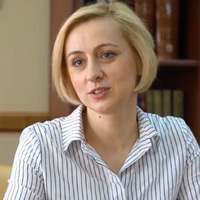
This statement was shared on the UCU news page as part of an article titled "It is time to start applying the concept of genocide with regard to what Russia has been doing to Ukrainians for the last 8 years." Svitlana Khilyuk is an associate professor and head of the Department of Legal Theory and Human Rights at UCU. In the fall of 2021, she was a visiting scholar at the Nanovic Institute.
The liberation of the suburbs of Kyiv exposed the atrocities of the Russian army and the armed formations under their control. From a legal point of view, the killing, abduction, torture, and rape of civilians in an international armed conflict are criminal acts at both the international and national levels.
Under the Rome Statute of the International Criminal Court, such acts can be considered as war crimes (not to be confused with military ones) and/or crimes against humanity. They do not have a statute of limitations and are increasingly subject to universal jurisdiction (i.e. that a person in one country can be prosecuted for crimes committed on the territory of another country).
Ukraine has not yet ratified the Rome Statute, but it has recognized the jurisdiction of the International Criminal Court on a special statement. Therefore, as of November 21, 2013, the jurisdiction of the ICC extends to the territory of Ukraine (including the occupied Crimea and Donbas) in terms of war crimes and crimes against humanity. This means that under international criminal law, persons who have reached the age of 18 and directly committed, facilitated, incited, as well as commanders who have not stopped these crimes against civilians, should be punished. It should be kept in mind that given the scale of criminal acts against civilians, it is unlikely that the actions of all Russian military men will be considered in The Hague. The main burden of prosecuting the perpetrators will fall on national courts.
According to the current Criminal Code of Ukraine, what we saw in the territories liberated from Russian occupation can be qualified under Art. 438 “Violation of the laws and customs of war,” which provides for punishment including life imprisonment. This crime also does not have a statute of limitations for criminal prosecution. At the same time, Ukrainian lawyers rightly point out that the current version of Art. 438 of the Criminal Code of Ukraine does not cover all possible socially dangerous acts against the civilian population by representatives of the aggressor state. Therefore, Bill 2689 was prepared, which provides for the systematic implementation of international criminal and humanitarian law in the Ukrainian criminal legislature. This bill was adopted by the Verkhovna Rada of Ukraine and submitted to the President of Ukraine for signature on June 7, 2021, where it is until now.
The abuse of Bucha and other Ukrainian cities by the Russian occupiers violates the Convention for the Protection of Human Rights and Fundamental Freedoms, in particular Art. 2 “Right to life”, Art. 3 “Prohibition of torture”, etc. This opens the possibility for dealing with the violated rights also at the European Court of Human Rights. Despite leaving the Council of Europe, Russia is responsible for violations of the Convention committed before September 16, 2022.
Dear UCU Supporters
Source: UCU
Wednesday, March 30, 2022
March 24th marked one full month of war in Ukraine. So many innocent lives have been lost, millions of people have been displaced, and yet Ukrainians, especially our young people, have moved into action to help those who are suffering.
Throughout this horrific month, Ukrainian Catholic University has hosted a number of relief groups who are using UCU as their operational headquarters. These groups are not only working at UCU, but many are also staying on our campus. Our students have supported their efforts by serving as interpreters, volunteering with them, and connecting them with resources such as medical supplies and transportation. Here are their stories.
Team Rubicon, a mobile medical unit of the World Health Organization has deployed its operational headquarters at UCU. The team of 22 specialists includes six doctors and medical staff from the United States and Canada.
“When you are out in a country that is not your own and trying to do this work... where you stay, where you sleep, where you work is very important and so having such wonderful accommodations helps us be much, much better when we go to the field and are actually applying our skills to those who need it.”—Jamie Brown, Rubicon representative
The 15 person Lviv team from SMART Medical Aid, a medical fund from the UK, currently live and work in one of the Ukrainian Catholic University buildings. The fund delivers equipment, medicine, ambulances, and sends them to the various hot spots all around Ukraine.
Join us in thanking these organizations for their selfless work for Ukraine!
Report on UCU’s Activities during the War
Source: UCU
Monday, March 28, 2022
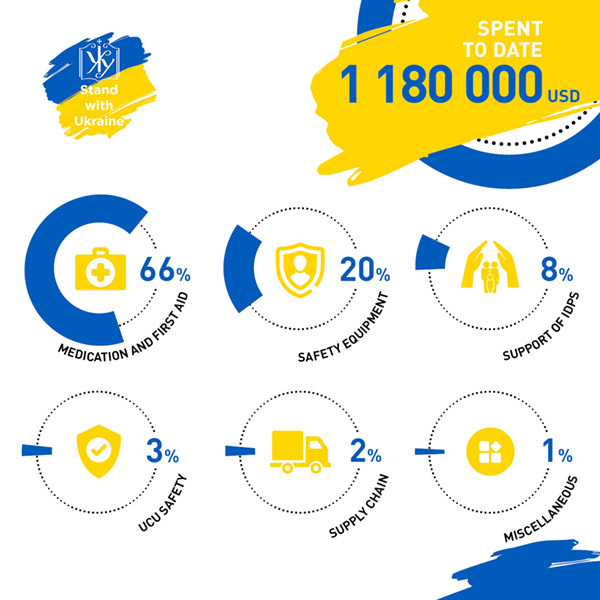
Since the beginning of the war, UCU has contributed $1.18 million to Ukraine's victory
“I do not see fatigue in your eyes. on the contrary—the activity is growing."—an excerpt from the appeal of Fr. Bohdan Prach, Rector of UCU, to the university community on March 25, 2022.”
Eight years of Russia’s war against Ukraine. One month since the beginning of Russia’s full-scale invasion of the sovereign state. One month ago, the world faced the greatest historical challenge of the last few decades because of the mad dictator’s whims and the tacit indulgence of the majority of Russian society. It has been one month since the previously quiet days and nights in Ukraine became filled with air raid sirens, shell explosions, tears of pain, and losses for millions of Ukrainian citizens. Today, there are no half-answers and half-measures for us Ukrainians. There is only an unconditional and dedicated struggle against the Russian invasion, our only chance to preserve our identity and state. Today, Shakespeare’s “To be or not to be” carries a sacred meaning for our country and the entire civilised world. Ukraine and its people have already started a powerful revolution. A new world order is being created – sadly, at the cost of great sacrifices on the part of Ukrainians.
There are thousands of fronts in this struggle, and the most important one is on the line of military confrontation. The heroic Ukrainian army has been defending our land from the Russian occupier for an entire month without rest. At the same time, millions of Ukrainians work on the home front, waging their daily battle against the enemy. The Ukrainian Catholic University is fighting, too, in its own way – through the efforts of its teachers, staff, students, and the incredible support of friends and philanthropists around the world to find a path to our future victory.
A few weeks before the full-scale invasion, the university established operational headquarters to ensure the stability, safety, and development of various scenarios of our institution’s activities in wartime. Today, in cooperation with the heads of the academic and administrative departments of the university, the headquarters ensures the efficient work of the university.
Read the report on UCU activities
Video messages from UCU
Source: UCU
Friday, March 18, 2022
We will defeat evil with good—word of the rector of UCU
UCU students address young people from Europe and America
Event: Solidarity with Ukraine
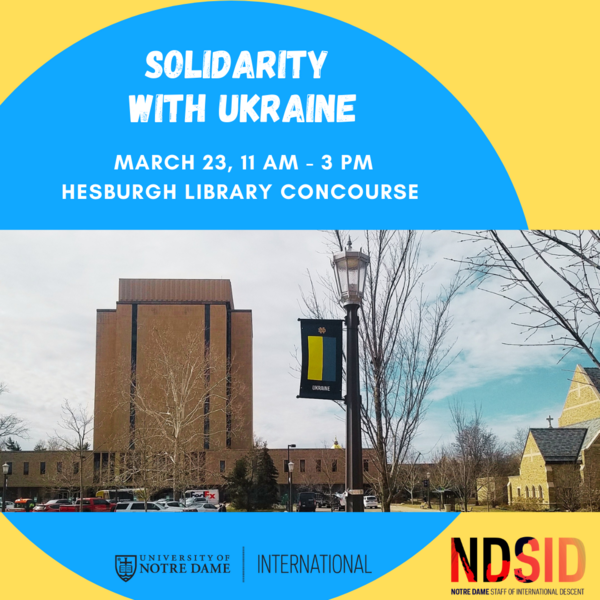
Source: Notre Dame Staff of International Descent
Thursday, March 17, 2022
Stop by to share your compassion with the people of Ukraine by the NDSID tables at the Hesburgh Libraries Concourse on March 23. Organized by a couple of NDSID members from Russia, we invite you to make symbolic paper hearts in the colors of the Ukrainian flag and post them up on our board to express your empathy and support. We will be providing information on reliable humanitarian aid organizations, which you may use to help Ukrainian refugees in Europe.
This event is organized by the Notre Dame Staff of International Descent and co-sponsored by Notre Dame International, the Department of German and Russian Languages and Literatures, and the Nanovic Institute for European Studies.
Dear Partners of UCU and Ukraine
Source: Students of the Ukrainian Catholic University
Tuesday, March 15, 2022
Stop the justification of the war against Ukrainian civilians and the Ukrainian nation
With this letter, we would like to draw your attention to the acts of open support of the atrocious war in Ukraine by the leading Russian university – Moscow State Institute of International Relations.
We are concerned that the war is being openly supported by the students of this university, and they are helping spread falsehoods and Russian state propaganda. Here's the link to their open appeal.
We believe that in the civilized world, there is no place for public support of war crimes being committed by the Russian forces in Ukraine. The promotion of the “war for peace” cannot be justified by the ignorance of the facts in the world of abundant information.
We ask you to publicly react to such statements by Russian students and academic institutions and help stop the justification of the war against Ukrainian civilians and the Ukrainian nation.
We hope for your support!
Yours sincerely,
Students of the Ukrainian Catholic University
Interview with Professor Yaroslav Hrytsak, historian, public intellectual and professor at UCU
Christophe came to Lviv from France to help Ukrainians
Team Rubicon: how do doctors from the USA and Canada help Ukrainians?
Interview with Myroslav Marynovych, Vice Rector of UCU, for the Ukrainian PEN Center's #DialoguesOnWar project
Source: UCU
Saturday, March 12, 2022
Myroslav Marynovych, vice rector of the Ukrainian Catholic University, took part in the #DialoguesOnWar project from The Ukrainian PEN Center. During the interview, he told Serhii Plokhii, Director of the Harvard Ukrainian Research Institute, about the events in Ukraine during the war. Ukrainian PEN is a Ukrainian non-governmental organization established to protect freedom of speech and copyright, promote literature and international cultural cooperation. It is part of the network of national centers of PEN International.
Several key theses from Myroslav Marynovych’s talk:
- Lviv’s railway station now appears as though it is from a film about World War II, and it’s horrible.
- Taras Shevchenko’s words of wisdom always speak to Ukrainians in difficult times. In prison, Kobzar, a collection of Shevchenko’s poems, revealed its inner depth and meaning to me much more than it did during normal life.
- When there is a clash between good and evil, Shevchenko’s relevance appears immediately. We, Ukrainians, say that his writings are like another Gospel for us.
- While Nazi ideology was condemned and forbidden by rule of law, this didn’t happen with communism. Victorious Soviets hid their crimes after the Yalta conference.
- There were no Nuremberg trials for communist crimes. In modern Russia, the seeds of communism gave springs for the new regime.
- Putin’s regime is the reincarnation of Stalin. He is still a hero for Putin and many many Russians.
- After 1991, Ukraine and Russia went in different directions. When Ukraine started inroads to European democracy, Russia regressed back to its totalitarian past. Ukrainians don’t want to go back as we already have freedom. Putin’s imperial vision for Russia cannot be realized without Ukraine, because his vision is only legitimate with Kyiv. This means we’re fighting for our independence.
- Putin’s regime uses three forms of evil: lies, hatred, and violence. Ultimately, this approach leads to a dead end
- Ukrainian identity is a mosaic. Our main challenge is to find a way to properly harmonize all the mosaic differences (after winning the war).
- Controversies between the Ukrainian and Russian speaking population in Ukraine would have never turned into a violent conflict without Russia having intervened. It is Russia who transformed these differences into the current war.
- Every nation has the ability to transform itself. The Russian nation also has this ability, but they will need a moral reckoning after the fall of Putin’s regime.
Dear UCU Supporters,
Source: UCU Foundation
Tuesday, March 11, 2022
Hundreds of thousands of Ukrainians refugees have traveled to Lviv seeking shelter. All in the city have opened their homes and hearts to those fleeing, including Ukrainian Catholic University. The university has converted every usable space to help those seeking shelter, and our students, faculty, and staff continue to volunteer their time to help refugees and Ukraine.
Just yesterday, a group of 30 orphans from Dnipro stayed at the university as they prepared to travel to Poland and then on to Sweden to safety. These precious children were greeted with chocolate, compassion, and a safe place to spend the night. Watch below:
UCU Students Organize Initiative to Create Energy Bars for the Hungry
Dear Partners of UCU and Ukraine!
Source: UCU Rectorate and Operating Group
Tuesday, March 8, 2022
Carthaginem esse delendam! / Carthage must be destroyed!
Dear Partners of UCU and Ukraine!
People around the world express their admiration about the heroic resistance of Ukrainians to Putin’s killing machine. Ukraine reminded the whole world what the idea of dignity stands for and why it is worth defending it even at the expense of one’s life. World leaders responded with a wave of holy wrath to the outright evil revealed in Russia’s premeditated and unprovoked aggression against Ukraine which keeps inflicting horrible suffering on the Ukrainian people. The West gets united in solidarity by standing for the truth and good against everything evil that has been revealed of Putin’s regime and by what it represents.
Deep in human hearts there is a longing for what is true, good and beautiful however much it is clouded by selfish interests and greed. The Maidan (Revolution of Dignity) that put Ukrainians on the path of pilgrimage to dignity in 2014 and which so irritated and scared Putin is now marching through the world. Dignity matters again. Let’s not forget this moment and remember what its price is. Ukrainians are now literally crucified by the wickedness of Putin’s Russia. When the world renews its spiritual energies, Ukrainians die under Russia’s ruthless assault.
Ukraine surprised the world at the moment of its deepest tragedy. How much more would it be able to surprise the world if it was given a chance of uninterrupted and undisturbed development for at least over two or three generations?! When we hear about institutions in the West celebrating their centennials without any major disruption of their operation, we can hardly imagine what it is like. Because in Ukraine it is nothing short of a miracle. As soon as Ukraine grows its new generation, its professionals in business, engineering, arts, spiritual life, education, etc., it is furiously attacked by the imperially obsessed Russia uprooting Ukraine’s vitality and dreams. Then Ukrainians must begin from scratch, over and over again. Then we keep hearing how disappointing our new steps are, how awkward our attempts at following the path of the developed and matured nations, how frustrating is our performance in democratic growth and how futile all our attempts to get an “A” in a democracy class… Would you like Ukrainians really surprise you? Give us a chance for no disruption for at least two generations, help us protect ourselves from the imperial neighbor.
During the last days we lost young volunteers Ruslan Karpenko, Ivan Zorya and Anastasiia Yalanska who tried to bring food and medicine to people in the towns under siege, a journalist Victor Dudar, a town mayor reaching out to people who cry for survival Yuriy Prylypko, an actor Pavlo Lee, Yulia Zdanovska, teacher and enthusiast of mathematics, and many other men and women whose dreams and talents might have served this Ukraine which could surprise any of us.
There are many lessons to be learned from this drama of human suffering. One of them should be an examination of conscience in the West. What happened to us that we were able to overlook and neglect the growing darkness in Russia?
Russia has never repented for its communist past, has never done moral reckoning with the atrocities that were committed on human lives in the name of bloody ideology. It has never brought dignity back to the victims of the Leviathan by collecting memories and remembering in prayer each innocent life which was taken by state violence. Russia has not only done nothing of the mentioned. It went the path of glorifying the communist past, of manipulating historic memory by reference to succession narratives of the present institutions from the Soviet ones. What could one expect from a country where its secret service (FSB) celebrates its centennial by reference to the establishment of Cheka, Soviet repressive and bloody police organization?! Such examples abound. Well before the war three-quarters of Russians believed that the Soviet time was the best epoch in the history of the country. 59% expressed positive attitude to Stalin and the idea for grand memorialization of Stalin and his epoch through building a monument and a new museum complex near Nizhniy Novgorod won 50% of supporters among those who were born after the breakdown of the Soviet Union. This number was steadily growing from 2005 where only 11% of the same age group were supportive of the idea.
The deep reflection on and repentance over the Nazism experience made the West alert and careful on not crossing certain lines in public policies and discourse. It made certain ultra-right-wing ideas concerning the experimentation with the human person and society repellent and utterly unacceptable in the civilized society. But the trauma of communism was reflected upon in depth and its tragic lesson was learned by heart neither in Russia nor in the West.
If the West is serious about recognizing itself in the broken mirror of suffering Ukraine, it must conduct its “Nuremberg tribunal” to condemn communism and Russian chauvinism with all the committed atrocities and violations of human dignity. This will eventually help Russian people to resist Putin’s incarnation of communist hubris in its ambition to dominate the world at the expense of respecting and affirming human dignity.
Today we appeal to our Partners not to let the West move from one complacency of comfort at any cost to another complacency of self-righteousness. Ukrainians deserve a chance for peaceful development without any disruptions from imperial Russia. Much moral work should still be done.
But first and foremost, Carthaginem esse delendam!
We deeply appreciate your attention, partnership and continuous support!
Yours sincerely,
Rectorate and Operating Group
New Online Resources
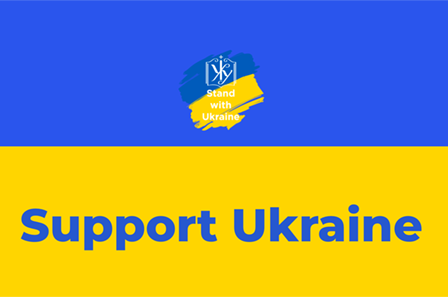
Source: Taras Dobko and Anna Romandash
Monday, March 7, 2022
Ukrainian Catholic University has created two new resources to highlight UCU official statements and student initiatives. Follow the links in the buttons below. The third resource below has been created by volunteers with the intention of sharing messages and information on the war in multiple languages. “Post to Stop War in Ukraine” is also designed to address misconceptions and debunk false narratives about the war.
Article by Anna Romandash for Notre Dame Magazine: "Awakening to Russian Aggression"
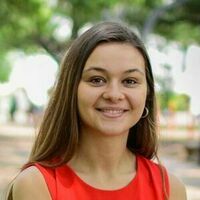
Source: Notre Dame Magazine
Friday, March 4, 2022
In an article for Notre Dame Magazine, Anna Romandash, a Ukrainian journalist and Nanovic-supported Master of Global Affairs student in the Keough School of Global Affairs, writes "the invasion of Ukraine must stir the global community to action in support of a besieged nation and the human rights at stake in the fight."
Daily video updates by Taras Tymo
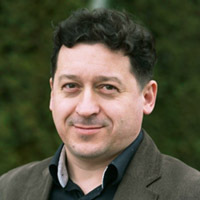
Source: Taras Tymo, Ukrainian Catholic University
Friday, March 4, 2022
Taras Tymo, a lecturer in patristics and theology at UCU in Lviv, has been recording daily updates in English since the first day of the Russian invasion on February 24. Tymo is a graduate of the University of Notre Dame, having obtained a Masters in Early Christian Studies in 2006. The videos are available as a YouTube playlist.
Appeal of Ukrainian Catholic University to the Global Academic and Research Community
Source: Ukrainian Catholic University
Friday, March 4, 2022
Today is the 9th day of the blatant military invasion of Russian aggressor into Ukraine and the 9th year of the war Russia started in 2014. This aggression is strongly supported by Belarus. The international isolation of the Russian Federation is increasing, with representatives of different industries and professions. The world refuses to cooperate with an aggressor-state that violates all the basic norms of a civilized community in all areas. Education and science must not be an exception.
For many years the scholars from Russia have benefited from various international research and internship grant programs provided by the Western democracies. Sadly, «return on investment» was used to strengthen and solidify Putin’s anti-democratic regime. Consummation of financial means without appropriation of the civic values and virtues is a manifestly unambiguous sign of the Russian academic community’s complicity with the regime. The shocking silence of a vast majority of the scholars in Russia in view of Russian invasion in Ukraine and the war crimes committed by the Russian army cannot be justified by any human and ethical standards. To willingly remaining silent and passive in view of atrocities and suffering inflicted by the Russian Government on the innocent civilian population of Ukraine makes Russian academia equally responsible for the crimes against humanity. Sadly, the Belorussian scholars also remain silent observers of Russia's crimes against humanity in Ukraine. Their support of the actions of the Lukashenko regime as well as silent contemplation of the Russian invasion is also a crime.
We believe that the academic community should lead by example and show an adequate reaction to Russia’s barbaric actions. We have to unite as a world to stand against aggression. Academia should be based on the values of honesty, justice, and respect for rights and freedoms of others. We are convinced that intellectuals and scholars have a special responsibility for peace, freedom and the prevention of dictatorship!
Dear Partners and Friends, please, find an Appeal Letter from UCU in the attachment!
We deeply appreciate your attention, partnership and continuous support!
Yours sincerely,
Rectorate and Operating Group
Yevhen Laniuk, Associate Professor, Department of Political Science, UCU
The eighth day: Ukraine is standing—Father and Head of the Ukrainian Greek Catholic Church
Stand with Ukraine!—Yuriy Pidlisny, Head of the Department of Political Science, UCU
Freedom Under Siege: A visiting professor from Ukraine witnesses "wickedness" threaten his native country
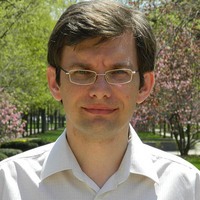
Source: Margaret Fosmoe, Notre Dame Magazine
Thursday, March 3, 2022
Taras Dobko, associate professor of philosophy and senior vice-rector at UCU, and visiting scholar at the Nanovic Institute, was interviewed for Notre Dame Magazine about the Russian invasion of his native Ukraine. Dobko describes watching events unfold over the last week and his own family's experience, and reflects upon Russian aggression towards Ukraine historically, in his lifetime, and in recent months and weeks.
Call for the establishment of the Network of Solidarity and Strategic Partnership with UCU (2022-2026)
Source: Ukrainian Catholic University
Wednesday, March 2, 2022
“There are universities that know how to turn anxiety into the energy of development, and then students can grow to twenty years in two days” —Maksym Kolyada, lecturer of UCU.
Dear Partners of UCU and Ukraine!
UCU community thanks to all educators, scientists, researchers, all colleagues, and Partners throughout the civilized world for their expressions of solidarity with us and the Ukrainian people in this tragic time of war. The international isolation of the Russian Federation is increasing, with representatives of different industries and professions. The world refuses to cooperate with an aggressor-state that violates all the basic norms of a civilized community in all areas. The higher education and research sectors cannot stand aside. Putin's war crimes, and Russia’s crimes against humanity, will be punished but only when the Russian people realize their complicity. For this to occur, the Russian educational sector must realize its failure to fulfill its primary function and its mission: to develop a humanist worldview. If tyranny and aggression win, we will all feel the consequences. As this destructive war continues, we call upon you not to stand aside, and we ask our international Partners and Friends to support what is True and Right. We demand action.
We encourage you to become a member of the Network of Solidarity and Strategic Partnership with the Ukrainian Catholic University aimed to help Ukrainian students and faculty with guaranteed and secured funding for study/internship/teaching/research programs abroad to be implemented during the next four academic years (Fall 2022 - Spring 2026).
Please, find the detailed information about a call to action [at the link below].
We trust in global academic solidarity!
Help the Ukrainian Society at Notre Dame support refugee families in need
Source: Christian V. McKernan
Tuesday, March 1, 2022
Please help the Ukrainian Society at Notre Dame support Ukrainian refugee families in need through Catholic Relief Services. You can find more information on how to support USND's work on the Notre Dame International's Solidarity with Ukraine page. Thank you for your prayers and continued support.
Support Ukrainian refugee families
Statement from Ukrainian Catholic University
Source: UCU Rectorate and Operating Group
Tuesday, March 1, 2022
Dear Partners of UCU and Ukraine!
The Russian Federation’s armed invasion in Ukraine, which has been going on for six days, has already led to a number of serious war crimes - shelling of children’s institutions, hospitals, and other civil objects, including cultural heritage objects in Kyiv, Kharkiv, Chernihiv and many other Ukrainian cities. After the barbaric and predatory attacks on our cities, the killing of children and civilians, we have every right to say that Putin attached to a modern Russian the “brand” of a barbarian. Everyone in the world needs to understand this. Today, Ukraine and UCU call on all states, international organizations, and all our valued Partners to release the world of Putin and his poisonous propaganda. This means eradicating the influence of the Russian system in politics, diplomacy, business, education and science, sports, culture, and other fields. The world must be cleansed of this toxic virus that brings death to the civilized world, democracy, and human dignity!
- The world’s international business shows now the united decision - exclude Russia in each possible field of international cooperation. A market nightmare precisely describes the Russian market’s situation since the sanctions have been imposed. The Russian invasion of the sovereign territories of Ukraine is causing a mass exodus of foreign companies from the Russian economy. From the oil giant BP which promised to exit its joint venture from Russian state-owned company Rosneft (19.7% stake) to an American subscription streaming service and production company Netflix, which refuses to broadcast Russian state TV channels in Russia. Disney, Warner, Sony, and Marvel have all decided to halt releases in Russian cinemas. The world’s largest LNG trader, Shell Oil, announced it would leave joint ventures with Gazprom, including the now-dead Nord Stream II. Norwegian oil and gas company Equinor stops all new investments in Russia and begins to exit its joint ventures with Rosneft. General Motors announced the cutting off of its business with Russia. The same announcement was made by Volvo Cars, Volkswagen Group, Daimler Truck. Aeroflot and other Russian airlines are banned from the 27-nation bloc in the European Union, together with the UK and Canada. Swiss Credit Bank, French Societe Generale, Dutch ING Group NV and Radobank refused from lending and investing in Russia. Apple announced to stop selling their items in the official online-store in Russia. The National Bank of Ukraine (NBU) has initiated a halt to the supply of cash foreign currency to banks in Russia and Belarus. The NBU appealed to the ambassadors of the G7 group and the heads of the central banks of these countries, European banks supplying cash and representatives of the international fast money transfer system Western Union to stop the supply of foreign currency to Russian and Belarusian banks. Dear partners, isn't it time to check and take an anti-putin virus test at our own organizations? Can we be sure that our academic and business communities are free from the destructive influence of Putin?
- Violation of International Law and crimes against humanity. On Tuesday, March the 1st, the prosecutor of the International Criminal Court addressed the situation in Ukraine stating that there is legal evidence of both war crimes and crimes against humanity made by Russian soldiers on Ukrainian territory. In 1949, as a result of the devastating World War II, European countries adopted the most important instrument of international humanitarian law - the four Geneva Conventions that prohibit killing and ill-treatment of civilians, the destruction of civilian infrastructure and the use of weapons that cause undue damage or unnecessary suffering. In the best traditions of the Hitlerite Empire, the military forces of the Russian Federation fire mostly on the civilian population and civilian infrastructure, taking lives every hour and leveling entire cities and villages. The Russian Ministry of Defence also announced its intention to bomb other military objects in the center of the capital. A few dozen meters from the stated target of the bombing is the St. Sophia Cathedral, a symbol of Kyiv Rus, decorated with mosaics and frescoes dated back to the 11th century - a historical period when Moscow did not yet exist on the map. The Putin regime hates Ukrainian identity! Putin is committing crimes not only against humanity but also against his own citizens. Today, Putin officially priced the lives of his soldiers to be 11,000 Russian rubles (an amount of money Russia promised to pay to the families of dead soldiers, which is a little bit more than 100 USD). We believe that human life cannot have a price. To save Russian lives, Ukraine in contrast is offering a full amnesty and 5,000,000 rubles to the Russian military, who will lay down its arms and surrender.
- Holocaust memorial ‘Babyn Yar’ bombing. Russian troops are also targeting objects of national and historical memory, violating all norms of UNESCO's international obligations. A major Holocaust memorial in Kyiv was struck today during Russia’s latest bombardment of the city, which targeted a television broadcast tower in the Ukrainian capital. This is a symbolic place for millions of people all over the world to remember the cruelty of the Nazi regime. In Babyn Yar Nazis massacred up to 100.000 Jews, Roma, and Ukrainians during World War II. Andriy Yermak, Head of the Office of the President wrote: “These villains are killing Holocaust victims for the second time”. During the accident, 5 people were killed. President Zelensky twitted: “Why to repeat "Never Again" for 80 years when the bomb falls if the world remains silent?”. We appeal to everyone still staying silent or claiming one’s non-political position - your silence kills, your silence destroys world heritage!
- Belarussian troops entered Ukraine. The enemy has seen him becoming weaker, and Putin has begun to engage his authoritarian allies in this conflict. A Belarusian column of 33 units entered the Chernihiv region, located north of the capital Kyiv, on March 1. Belarus' self-proclaimed President Alexander Lukashenko previously vowed that Belarusians would not participate in Russia's war against Ukraine and would not let Russia use the Belarusian territory for that purpose. Lukashenko, in particular, may try to invade Ukraine's northwestern territories, which Russia hasn’t so far considered as a priority. Global community should have no doubts that authoritarian regimes would not respect international obligations. Lukashenko should be recognized as a war criminal together with Putin.
- The European Parliament approved Ukraine’s application for joining the European Union and recommended member states to grant Ukraine candidate status. Today we all are a part of the historical moment. On March 1st, the European Parliament approved Ukraine’s application for joining the European Union and officially started a special procedure of consideration of Ukrainian membership. A President of the European Parliament Roberta Metsola stated, “We recognize Ukraine's European perspective… We must meet the future together”. The European Parliament signed a resolution that condemns Russia's war against us, calls on Russia to withdraw all its troops from our territory, and calls on EU institutions to work to grant Ukraine EU candidate status. We firmly believe that such steps and further logical actions by European states can effectively accelerate the cessation of the war and can give a worthy rebuff to the Russian international criminal. We understand that there will still be a lot of work and effort ahead, but the guarantee of your support will allow us to work for a concrete result and goals that will be common to the whole nation.
- UCU: a model of “workshop university.” Our University now finds itself in an entirely “new reality”. To handle the situation well the Operating Group was created with a mandate to meet the urgent needs of the community, strengthen physical and digital security, and build our capacity for resilience. One of the key questions was what to do with the educational process. In 2004 and 2013-14, when Ukraine went through two revolutions to safeguard its democratic development and rule of law, the University transferred its education services from classes to the streets. Students went through tempering experiences of social activism, public service and civic responsibility. We decided to use a similar model now and turned the university into a workshop. The war is the most extreme case filled with cruelty, humiliation, violence and human suffering. Even people with strong characters and rich experience could get traumatized. What to say about young immature students? If they are left alone, they could be overwhelmed with anxiety and stricken by fear. It is also impossible to hold classes online at such a time. Students are not able to concentrate and focus on regular content. Moreover, they will miss learning the most important antidote against fear and feeling of helplessness which is human solidarity and doing something important together. So, UCU moved to a model of ‘workshop university’. Students are required to participate in ‘classes’ either in person or remotely. But these days classes are designed in accordance with the service-learning model. Each program, teachers and their students had defined their own way of enacting social change. That should help the students to better understand the situation, to find the project which could prove them useful in helping others, to reflect on the acquired experience, and go on. UCU is being transformed now into a big workshop and a spider web of many projects for enacting human dignity in these perilous times. Young people draw their energy for facing the hard and tragic reality of war from their fellow students, community, and God. In the appendix to the letter, we provide you with a list of those student networks that are successfully operating for the sake of Ukraine’s victory. If you are willing and able to support these initiatives, below we also provide information on how to do so.
Pope Francis has called on everyone to organize a Day of Prayer and Fasting for Peace in Ukraine on March 2, Ash Wednesday. On this day we all can share the sufferings of the Ukrainian people, to make everyone feel like brothers and sisters, and to pray to God for the end of the war. We welcome you to join this initiative together with UCU!
Good and truth will prevail!
Yours sincerely,
Rectorate and Operating Group
Notre Dame International launches "Daily Updates from UCU"
Source: Michael Pippenger, Vice President and Associate Provost for Internationalization, University of Notre Dame
Tuesday, March 1, 2022
Notre Dame International has set up a live webpage that shows Notre Dame’s solidarity with UCU and Ukraine. It is housed within Notre Dame International’s website and provides a space for: UCU’s daily updates, accurate information, videos, and news sources; information on how to give and be involved; and events on campus related to the Notre Dame community's engagement with this crisis.
More on Notre Dame's solidarity with Ukraine
Appeal to Members of Academia from the Ukrainian Catholic University Law School
Source: Svitlana Khyliuk, Associate Professor and Director of the UCU Law School
Monday, February 28, 2022
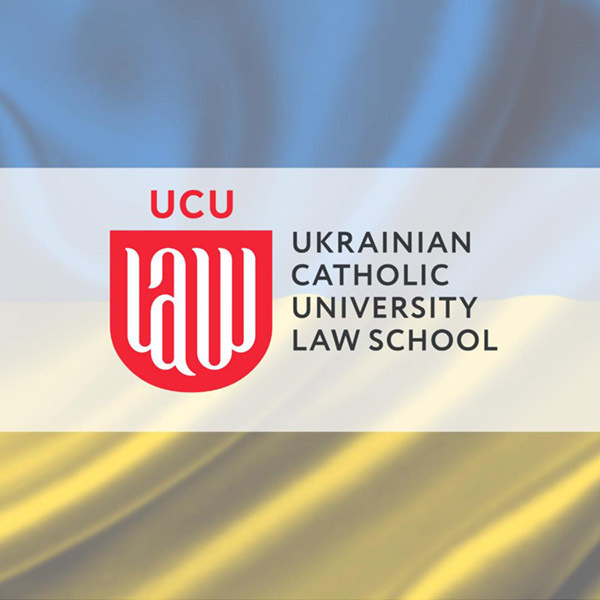
Dear Members of Academia, Colleagues, Friends!
Few days ago, at 5 a.m. of 24 February 2022, Russia launched an unprovoked full-scale military invasion against Ukraine in manifest and flagrant violation of international law. Since then, peaceful cities were bombed indiscriminately by Russian soldiers, causing hundreds of casualties among civilians. Ukrainian Army has shown an unprecedented courage and resists the invasion. Ukrainian society is united in supporting our defenders in any way we can.
Many states imposed severe sanctions upon Russia and provide support to Ukraine. We in Ukraine are deeply grateful for all the support and solidarity we have received from the world. However, more can and should be done to end Russian aggressive war against Ukraine and prevent this from happening again in the future. Therefore, we appeal to all members of academia to:
- Express in strongest terms the condemnation of Russia’s aggressive war against Ukraine. Academia cannot remain silent when international rule-based order is being destroyed and should speak the truth to power;
- Suspend all forms of academic cooperation with Russian institutions, not to participate in any events organized by Russian institutions or held in Russia. Academia should be based on the values of honesty, justice, and respect for rights and freedoms of others. By and large, Russian academia remains silent on the issue, thus providing tacit approval for the state’s unlawful actions;
- Expel Russian members from your Boards of Trustees or Scientific Boards, as well as Russian funders or sponsors in general;
- Strip Russian nationals from honorary positions within your institutions;
- Discontinue scholarship programs dedicated to Russian applicants and allocate them to the nationals of states affected by Russian aggressive imperialist policies – Ukraine, Georgia, Moldova, Belarus.
We also urge the members of academia and all the people of good will to join our public letter calling upon your respective governments to:
- Review the status of Russian permanent membership on the UN Security Council regarding its compliance with the text of the UN Charter, as well as Russian activities within the UN institutions;
- Support Ukraine’s European aspirations, grant Ukraine the status of ‘EU candidate country’ and provide a clear and speedy roadmap for accession – no country has suffered and sacrificed more for its desire to become the part of European family, for its commitment to the values of human dignity, freedom, democracy, equality, the rule of law and respect for human rights;
- Develop a clear roadmap for Ukraine’s NATO membership – Ukraine requires stronger security guarantees, since the Budapest Memorandum and security assurances provided therein proved to be practically worthless;
- Urge the OECD to open accession discussions with Ukraine – Ukraine will need a strong economy and considerable support and assistance in the process of post-conflict rebuild and development.
Today is not the time for half-measured actions. The world ignored Russian invasion of Georgia in 2008; the world did not react adequately in 2014 when Russia occupied Crimea and started the war in Eastern Ukraine. The world cannot repeat the same mistake over and over again. Impunity encourages new violations.
In the famous words, “the only thing necessary for the triumph of evil is for good men to do nothing.” We believe that academic community should lead by example and show an adequate reaction to Russia’s barbaric actions. Therefore, we appeal to the academic world to show your solidarity with Ukraine.
With respect and deep gratitude for your support,
Ukrainian Catholic University Law School
UCU students take action
Source: Ukrainian Catholic University
Monday, February 28, 2022
Dear UCU Foundation Family,
Thank you. Your notes of compassion and support inspire us with hope. We’d like to give you an update on what has been happening at UCU.
This weekend, Ukrainian Catholic University has set up a Humanitarian Support Collection Center on its campus. In response to the significant need and request for medicines and medical supplies, UCU’s Sheptytsky Center has become a collection site for medical aid including tourniquets, dressings, antibiotics, medical gloves, medical screws, painkillers, syringes, blood transfusion systems, blankets, meal kits, and other essential items.
Our student and faculty’s bravery and commitment to Ukraine inspire us all. We ask you to please share these inspiring stories with your networks in the spirit of solidarity. Thank you!
Interview with Anya, second-year student of philology, about collecting donations for the Ukrainian army
Anna says: “My father went to the front, my mother stays at home, and I’m here. We have something to do and we sublimate the experience this way. I’m with people who are close to me, because we all work together.”
UCU student volunteer movement to support Ukraine
Volunteer work at UCU is in full swing. Everyone is joining in support of Ukraine and its army.
UCU students urge the global community to not remain silent
The story of UCU student and her family who had to evacuate from Kharkiv
Alisa Balakirska is a fourth-year student in applied sciences. Her family has had to evacuate Kharkiv because of the war.
UCU Students prepare to receive refugees from all over Ukraine
You are part of the big Ukrainian ocean
Source: Ukrainian Catholic University
Monday, February 28, 2022
Expressing gratitude to our friends from abroad
Source: Ukrainian Catholic University
Monday, February 28, 2022
Statement from Ukrainian Catholic University
Source: UCU Rectorate and Operating Group
Sunday, February 27, 2022
"[Ukraine is] one of us and we want them in the European Union", Ursula von der Leyen
Dear Partners of UCU and Ukraine!
Today, Russian occupation entered its 5th day of military aggression, with hundreds of casualties, hundreds of thousands of refugees, and millions of destroyed lives. This is more than a Russian invasion of Ukraine. It is a brutal assault on democracy, humanity, global order and the whole civilized world overall. Since the beginning of the war on February 24th, much of the international community pledged its support for the Ukrainian people in various forms. Diplomats work tirelessly. We see large-scale and influential sanctions against the Russian economy. Ukraine's allies are sending financial and military aid. Likewise, many international companies, NGOs and initiatives have joined in helping Ukraine. Unfortunately, all these enormous efforts have not stopped the war yet. The Russian killer is relentless!
- Death of Ukrainian children. Russian missiles keep dropping on civilians’ heads and buildings. Russians keep attacking kindergartens and orphanages, thus committing war crimes and violating the Rome Statute. Hospitals and mobile medical aid brigades are also targeted by the Russian shellfire and the sabotage groups, working in Ukraine’s cities and towns. According to the MFA’s report, as of today, 352 people including 16 children were killed and 1684 people (116 children) wounded in Ukraine during five days of the Russian invasion. (The numbers are being updated). Russia will have to answer for its behavior at the World Court in the Hague. Ukraine has submitted its application against Russia to the ICJ and we request an urgent decision ordering Russia to cease military activity now and expect trials to start next week. Your active civic support and demand that Putin and Russia be convicted of their crimes will help to restore confidence in and effectiveness of international law.
- Ukraine’s official request to join the European Union. For centuries the Ukrainian nation has fought for its own independence as an equal and rightful European state, with a strong identification with European values, such as democracy, freedom, equality, just governance and human rights. After gaining independence, we keep proving that we are part of European society. We defend our freedom, dignity, and future. We protect and develop norms, laws, and reforms that are important for being a modern and free country. We are fighting not only for our lives and freedom but also for the whole European society that we respect, admit and want to be a part of. Today, the President of Ukraine Volodymyr Zelenskiy signed a historical application for Ukraine's membership in the European Union. Thanks to the support of many European countries and the President of the European Commission Ursula von der Leyen, we feel confident that this will be an important step in order to not only finalize our integration to the European Union but also to achieve true peace. Your voice is critical at this moment! Please appeal to your governments and your representatives in parliaments to support our aspiration.
- Negotiations with Russia. To stop fatalities, Ukraine decided to hold its first negotiation session with Russia near Ukrainian-Belorussian border. The aim is to cease fire on Ukrainian territory to prevent casualties. As a result of the first session and according to the Ukrainian delegation, both sides identified common topics that they must work on and departed back to their own capitals for further consultations and implementation of the first session. The next session will happen shortly. The start of the negotiation process is a crucial part of peace in Ukraine. Our delegation will defend Ukraine’s national interests and sovereignty. Nothing much was achieved during the first session. But the meanness of the aggressors knows no limits. During the talks, the parties agreed to a ceasefire. However, taking advantage of the moment, Belarus and Russia continued to attack Kharkiv, Kyiv and other settlements from the air. We emphasize once again that the words and promises of the Russian regime are worth nothing.
- Referendum in Belarus. The dictator Lukashenko signed a decree appointing a referendum on amendments to the Constitution of Belarus on February 27. As a result of this referendum, he wanted to strengthen his power and create additional danger for Ukraine and the world. In addition, he creates security guarantees that do not allow him to be held accountable for his actions during his terms. Most importantly, he deprives Belarus of its nuclear-free status. These changes mean that he does support the war against Europe. He is ready to get nuclear weapons from Russia and use them not only as a blackmail instrument but also to kill our soldiers, families, and children. Almost 66% of people “voted” for the amendments to the Constitution. We ask you to support the decisive steps to stop another dictator who instigates the war, kills our soldiers and civilians by dropping the missiles from the country he made a hostage of his lunacy. The consequences of Lukashenko’s actions can be fatal and affect citizens of all countries.
- Humanitarian crisis at Ukrainian border. We Ukrainians are thankful and proud of all the support of our fellows worldwide providing help to our people and assert human values to win the war against totalitarianism and dictatorship. While many Ukrainians are fighting, there are the ones who must save their young kids, some of which have just been born. International volunteers are working hard to provide these people with the possibility of saving their souls from the enemy’s fire. Providing shelter in neighboring countries, food, basic sanitation, and hygiene products is crucial. Women with little kids who stay at the Ukrainian border sometimes for 3-4 days need resources to survive during this period of turbulence. Most necessary at the Ukrainian border is food, baby food, water, diapers, wet wipes, coverlets, toilet paper. We ask you to become a part of global solidarity with Ukraine now and address NGOs and volunteer centers with help. The young Ukrainian generation will forever remember the good that the world community provided them with!
- How does the Ukrainian Catholic University deal with the current state of war? The community of the Ukrainian Catholic University is now being actively engaged in various volunteer activities. Our main objectives: Witness, Serve and Communicate lead us through these hard times. UCU operating group has been working non-stop since the first day of Russia’s full-scale invasion in Ukraine. For example, UCU cooperation with UNICEF has launched the assistance to refugees to provide them with the first necessary humanitarian aid. UCU has also become a center for many volunteering projects, including media coverage of war, humanitarian aid, city security, IDPs support etc. Our students are redistributing clothes, food supplies, medicines and hygiene products for the soldiers all over Ukraine and to IDPs, who came to Lviv. Yesterday, 27th of February, we handed over to the military: 1 quadcopter, 5 walkie-talkies, 8 phones, 51 power banks, 23 boxes of food (including thousands of bars, dry food, coffee, tea, canned food, etc.), 15 chargers, 19 large boxes of medicines and many many other items. We do not stop the educational process, despite the recommendation of the Ministry of Education and Science to pause instruction for two weeks. We believe that there can be no vacation during the war. Traditional lectures have been canceled, however all classes were transformed into practical activities according to the service-learning approach that UCU has been pioneering for the last few years.
We must win! We must be united in this struggle!
Yours sincerely,
Rectorate and Operating Group
Global academic community stands in solidarity with Ukraine
Source: Ukrainian Catholic University
Global statements of support, February 25, 2022
Global statements of support, February 26, 2022
Students of Ukrainian Catholic University respond
Source: Ukrainian Catholic University
Friday, February 25, 2022
The following videos and texts were provided by students of the Ukrainian Catholic University (UCU).
UCU students read the poem “Europe was silent” by Oleksandr Oles
When Ukraine fought for the right to live
With butchers, lived and died,
And waited, desiring only compassion,
Europe was silent.
When Ukraine in an unequal struggle
Shed blood and with tears flowing
Awaited friendly help,
Europe was silent.
When Ukraine in an iron yoke
Toiled as a slave and plowed while wounded,
That even the voiceless rocks were moved,
Europe was silent.
When Ukraine that bloody harvest
Reaped for her murderers, herself dying
Her words failing from hunger,
Europe was silent.
When Ukraine cursed her life
And the land became a grave,
Even the evil demons wept as
Europe was silent.
Oleksandr Oles, 22 August 1931
UCU students in shelters
We were hiding in a shelter in Lviv this morning because we had an air alarm signal and the authorities called for us to go to a shelter for security! Ukraine is at war! And it's true! This is not fake, not fiction, not the education of the population! This is a real war! We have felt it and experienced it for ourselves! Let's not be afraid, let's defend ourselves because we are on our own land!!! Together we will survive! Together we are strong!
UCU students volunteering
Every student, teacher or UCU employee helps our soldiers in their own way and according to their abilities.
Discussion of the situation in Ukraine from the 2022 conference on "Integral Human Development in the Digital Age"
Source: Ukrainian Catholic University
Friday, February 25, 2022
From Wednesday, February 23, to Friday, February 25, 2022, the Ukrainian Catholic University held its annual conference on "Integral Human Development in the Digital Age." This year's conference, which focused on "Social Justice, Human Rights, and the Common Good: Facing the Danger of Totalitarianism" proceeded, despite Russia's invasion. During the conference, scholars shared the following about the war in Ukraine.
Volodymyr Turchynovsky, Dean of Social Sciences Faculty and Director of the International Institute for Ethics and Contemporary Issues, Ukrainian Catholic University
Volodymyr Turchynovsky served as a visiting scholar of the Nanovic Institute for European Studies during the 2006-2007 academic year and, again, in fall 2019.
All of us are in a very difficult situation right now and I want to give some impressions that struck me the most.
Firstly, all the world has to admit the impressive and heroic sacrifice of our soldiers who are selflessly defending our country. Really impressive was the sacrifice of our soldier Vitaliy Skakun who protected a bridge with his life, a sacrificial act of heroism.
A column of enemy tanks was actively moving deep within Ukraine. To stop it, a decision was made to blow up the Henichesk automobile bridge. The engineer of a separate battalion, Seaman Vitaliy Skakun, volunteered to perform this task.
The bridge was mined, but Vitaliy didn’t manage to get off it. He contacted his fellows, informing them that the bridge was being destroyed and then an explosion was heard.
Also impressive are the lines of dedicated volunteers who are working to supply and support the Ukrainian army, and they don’t stop for a minute.
We are also impressed by millions of donations from ordinary Ukrainians and people from all over the world to fund our ability to resist.
I also see the faces of Russian prisoners who are lost; they really don`t understand and they’re really lost, totally confused.
Oksana Kulakovska, Director of the Analytical Center, Ukrainian Catholic University
We appreciate the involvement of international scholars in this most difficult moment in our history as a sovereign country. It is a decisive moment for all of us, but I can’t be really pessimistic. In order to understand how we have to deal with this situation, we need to understand that the enemy wants to eliminate our country. We can see a dozen examples which will build not only the history of our country but also of the whole world.
We need different kinds of support from the world community. Can we expect it now? This is a big question.
The first thing that has to be done—Russia will do everything to behead our state and annihilate our will in days. This really unites all people under that threat.
Ostap Krvydyk, international security expert, and Chair of “Ukraine and the World” Program, Analytical Center, Ukrainian Catholic University
There is no better opportunity to go from study to action. My mission is to provoke the outrage of the international community. Immediately we and the international community need to begin the process of planning, how to place Putin before an international tribunal. He needs to be held accountable for all the crimes he has done against Ukraine, Georgia, Syria, and the whole civilized world. We need a board of people who can speak on an international level about this. We need public advocacy from you. Evil should be named and brought to the court.
Sr. Helen Alford, Vice-Rector of the Pontifical University of St. Thomas Aquinas (Angelicum)
The Church in Ukraine has great respect in society. In no other country of Europe do religious communities have such strong influence. The Church is a strong social actor that unites Ukrainians for the fight. The Russian aggressor uses the Church and religious narrative in an entirely different and completely unacceptable area. It uses the Church and religion in a criminal way, to legitimate the evil which it is doing.
Building the peace process is important – we need to reconstruct the security situation in Europe. The church needs to be involved in that.
We see quite a grim picture, but it`s realistic. The message for Ukrainians is grim, but also for Europe and Russia.
A. James McAdams, the William M. Scholl Professor of International Affairs, University of Notre Dame
I can’t express what all Ukrainians are now experiencing. Here in the USA, many of us are trying to convince our politicians and establishment that the fate of Ukraine is the fate of the whole world. We see manipulation on the part of the media and some politicians in Europe and the USA, though my humble goal is an attempt to understand and explain the situation in Ukraine to Americans. Unfortunately, for too long we’ve had the illusion that Putin will come to his senses.
What’s happening in Ukraine can happen anywhere. Many politicians use the situation in Ukraine for their own political games. We, however, are trying to do everything necessary so that the USA will get involved as much as possible to change the situation.
José Casanova, Professor Emeritus and Senior Fellow of the Berkley Center for Religion, Peace and World Affairs, Georgetown University
I’m very happy to see you all, regardless of all the circumstances. The world is united, after the fact of encountering evil, unfortunately. Many Western intellectuals who supported Russia have now changed their minds. To a significant extent, this became possible through the voice of Ukrainian intellectuals, and also of those scholars from all countries who study Ukraine.
In fact, you’re fighting public thought in Europe, which is fairly pro-Russia, and they are trying to balance between interests. The media repeats Putin’s message and we have to make more space for the Ukrainian voice in the West.
We should begin the process of the legal trial of Putin right now so that they understand what awaits them in the future.
Clemens Sedmak, Professor of Social Ethics and Director, Nanovic Institute for European Studies, University of Notre Dame
The day Russia invaded Ukraine we received many messages from the Nanovic community in support of Ukraine.
It’s important that we inform the world that Ukraine is a cultural pearl, a country of deep religious faith, a country of significant literature and beautiful operas.
All of us need to give a testimony of prayer and to witness to the truth. The Notre Dame community joins all its forces in support of the Ukrainian people, who are fighting for their freedom.
Archbishop Borys Gudziak, President of Ukrainian Catholic University
Archbishop Gudziak received the 2019 Notre Dame Award from Notre Dame President Rev. John I. Jenkins, C.S.C. Archbishop Gudziak started the Ukrainian crisis media center, a centralized way to inform the world about Ukraine.
Now I'm in Paris, ceaselessly speaking with people, meeting with people. With all our might we’re trying to unite the civilized world.
Now we must unite university all over the world with the goal of supporting Ukraine.
As with all of us, I’m a bit off-balance – Ukraine needs global, united international solidarity. Bringing students together and becoming re-translators of what is going on. We need to help students go from fear to dignity, as it was during the revolution of dignity.
People are coming together. We pray, and people and soldiers are becoming strong. I pray for Putin’s conversion and a miracle. And the Lord will not stop doing great things.
Myroslav Marynovych, Vice-Rector for University Mission, Ukrainian Catholic University.
In September 2021, Marynovych visited the University of Notre Dame and delivered the 2021 Nanovic Forum lecture.
About three illusions of the West:
Some people of the West overestimate the strength of Russia and underestimate the strength of Ukraine.
Putin will not stop at the Polish border. His next goal will be to revive the USSR and get NATO out of Eastern Europe.
The West says that they are giving us everything possible and that more support will be a cause of World War III. However, the West’s half-heartedness can lead to difficult consequences for the world eventually.
We know about the importance of values: Jesus never betrayed His values, even before the face of death, and we should demonstrate this to everyone in the West. It is Ukraine that is now in the forefront of defending the most important human values.
Statement from the Ukrainian Catholic University
Source: Ukrainian Catholic University
Friday, February 25, 2022
Dear UCU Partners and Friends!
Your letters of compassion and support inspire us with great hope and gratitude for your reliable partnership! The situation in Ukraine is horrible – our militaries and civil people are dying under enemy bombs, the terrible sound of the alarm system in the morning and night makes us run and hide with our families in shelters. But in these darkest times, we are uniting and praying for peace and victory! We believe that challenges and threats make us stronger with a reliable, friendly shoulder both in Ukraine and abroad. In this situation, when many people in Ukraine feel constant anxiety and fear, we are trying to inspire optimism and hope. Today, it is significant for us to be an island of stability for all – God is merciful!
The whole Ukraine is teaming up to resist Russian aggression. But is it enough to stop the war with one of the largest world military powers? Elimination of the main variable of this war requires everyone’s help. Every one of us who believes in democracy, dignity before God, and humanity!
We have to unite as a world to stand against aggression. The academic community holds an unprecedented amount of political and social influence, and we are writing this letter today to stress that there is a strong demand for the intellectual elites at the world’s leading higher institutions to use the platform bestowed upon them to take a definitive stance today.
A clear position of academia worldwide and a consensus on Russia’s unprovoked and unjustified attack on Ukraine can be an important signal of condemnation of the actions of the Russian Federation and necessary support for Ukraine, democratic values, and international security.
The Academia must show its support for victims of this unprovoked war, which is unleashing a humanitarian crisis.
Therefore, we are requesting you to join other opinion leaders across the globe to stand with the Ukrainian people in the defense of our lives, the wellbeing of our families, and the security of our sovereign land. The key aim of the Russian attack is not only to seize Kyiv, and to shift Ukrainian legitimate authorities, but to prove their savage idea that democracy is not working, that it is weak and global order has collapsed.
We should unite all our efforts to stop it now!
Please, approach your national governments with the following appeals:
- We ask to daily condemn the aggression on all and any diplomatic platform, in any international organization.
- We ask for financial and humanitarian assistance, weapons, petrol and equipment for Ukraine.
- We ask to lobby for devastating sanctions on Russia, including a SWIFT cut-off, embargo on the import of Russian oil and gas, freezing of Russian state assets abroad, closing ports and airports for Russian ships and planes. To stop the war, the world needs to introduce sanctions with immediate effects. Every day of delay means the death of innocent people.
- We ask to completely block Russian state media in your countries. They spread lies, propaganda and poison your countrymen and countrywomen.
- We ask to lobby for a No-Fly Zone over Ukraine. This practice was used in Libya in 2011 when NATO suspended all flights over the country’s territory. This measure should be introduced to protect Ukrainian civilians from Russian jets, drones, and missiles.
- We ask you not to allow a naval blockade of Ukraine, since it will jeopardize not only the Ukrainian economy but also the food security of many countries.
- We ask you to force Russian troops to leave the Chornobyl zone in order to avoid another global ecological catastrophe.
His Beatitude Sviatoslav says: “Our Ukraine, which the world fairly called “lands of blood”, which has been so many times sprinkled with the blood of martyrs and fighters for the freedom and independence of its people, calls us today to stand up for it – to defend its dignity before God and humanity, its rights for existence and the right to choose one’s future!”
We hope for your support!
Yours sincerely,
Rectorate and Operating Group
Catholic Universities Partnership in solidarity with Ukrainian Catholic University
Source: Catholic Universities Partnership Members
Friday, February 25, 2022
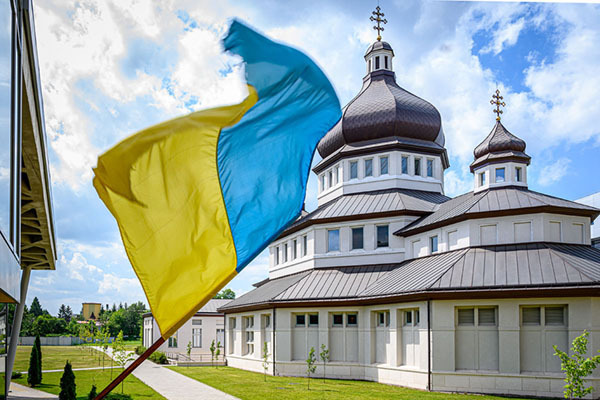
The academic communities of the Catholic Universities Partnership want to express their solidarity with the Ukrainian Catholic University and their support for all Ukrainian colleagues and students with their families.
We are deeply troubled by the Russian invasion of Ukraine and the war in Europe. We condemn the invasion as a gross violation of international law and disrespectful of standards of decent human morality.
We want to express our commitment to the UCU community and our willingness to support our friends in Ukraine in any possible way.
We offer our prayers and our faith-filled hope. We fervently pray for peace.
We will be alert and make sure that our colleagues and students are well informed about what is happening in Ukraine.
The Catholic Universities Partnership aspires to be a true partnership, also and especially in difficult times. We are united in our faith in Christ, the Prince of Peace.
Reliable Ukrainian sources of information available in English
Source: Taras Dobko and Oleh Turiy
Thursday, February 24, 2022
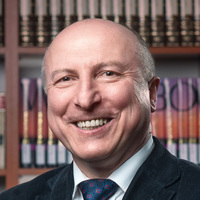

The statements and links below come from Taras Dobko, associate professor of philosophy, senior vice-rector at Ukrainian Catholic University and is presently a visiting scholar at the Nanovic Institute (spring 2022), and Oleh Turiy, vice-rector for external affairs and associate professor of church history at Ukrainian Catholic University, who also served as a visiting scholar at the Nanovic Institute in fall 2018.
Dear Friends, Colleagues and Partners of UCU,
Ukraine stands firm against Russian invasion. We have no doubt that Ukraine will be victorious in defending dignity and freedom. This war is not just the war of Russia with Ukraine. The Kremlin's regime is ruining the fundamentals of international order.
We ask for your solidarity in prayer, in sharing true information, in supporting the Ukrainian army and in providing humanitarian help.
- Oleh Tury
Reliable Ukrainian sources of information available in English:
- Voice of America News
- Ukrainian News
- Ukrinform
- Ukraine World
- Twitter: Dmytro Kuleba, Ukrainian Minister for Foreign Affairs
- Instagram: svidomi_ua
- Official website of the President of Ukraine
Ukrainian Catholic University information channels:
Video message from Miroslav Marynovych, Vice-Rector of Ukrainian Catholic University
Source: Ukrainian Catholic University
Thursday, February 24, 2022
This video message comes from Miroslav Marynovych, a Ukrainian social and political activist, Gulag survivor, and vice-rector for university mission at Ukrainian Catholic University. In September 2021, Marynovych visited the University of Notre Dame and delivered the 2021 Nanovic Forum lecture. He met with many Notre Dame students, faculty, and community members during his visit.
Marynovych’s Nanovic Forum lecture (along with more details on his visit) is available to view online.
Letter from Rev. Dr. Bogdan Prach, Rector of Ukrainian Catholic University
Source: Rev. Dr. Bogdan Prach
February 24, 2022 (3:00 p.m. ET / 10:00 p.m. EET)
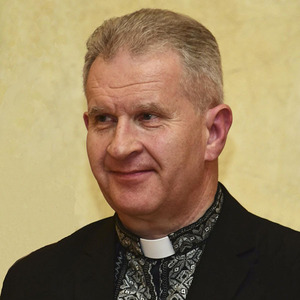
Dear Partners of UCU and Ukraine!
Today, on the 24th of February, at 5.00 AM the armed forces of the Russian Federation backed by the Republic of Belarus launched an intensive shelling of numerous Ukrainian cities and delivered missile/bomb strikes on the military infrastructure of the Armed Forces of Ukraine. At the same time, the aggressor started artillery shelling of the areas and settlements along the state border and administrative boundary with the temporarily occupied territory of Crimea.
This war has been going on for the last 8 years, but today, Ukraine and the whole world face the greatest danger since 2014. Do not believe that this war was provoked by Ukraine. We are a peaceful people defending right now our Motherland and a right to live in a free democratic country!
We call on now all our Partners abroad to be alert and show your solidarity with the Ukrainian people and the Ukrainian academic community. The evil is revealed now, and there is no space for cajoling the aggressor. Now, more than ever, we need the support of the entire global academic community. It will be extremely helpful for us if you approach your governments with institutional and/or individual appeals to support Ukraine with military, economic, and humanitarian assistance and to impose devastating sanctions against Russia. Remaining silent and apathetic are the greatest enemies right now.
This war is not just the war of the Russian Federation with Ukraine. The Kremlin’s regime is ruining the fundamentals of international order. So, for all of us, this is the war of the entire civilized world against dictatorship and against violation of the basic rules of international law.
Despite the harsh circumstances and no matter how great the challenges stemming from today’s world crisis, our spirit remains strong, and together with the help of our Lord, strong Ukrainian Army, and inexhaustible global academic support, we are – incomparably stronger to defeat the evil that rebelled against humanity!
Ukraine strongly needs your support!
Please, pray for the peace and victory of Ukraine!
With sincere gratitude,
Rev. Dr. Bogdan Prach
Rector, Ukrainian Catholic University
A Message from the Dominican Sisters and Friars in Ukraine
Source: Rev. Petro S. Balog
Wednesday, February 23, 2022 (9:45 p.m. ET / 4:45 a.m. EET)
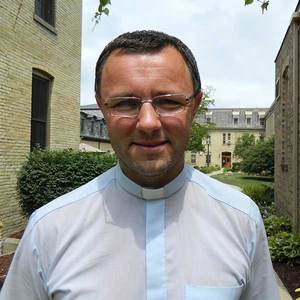
The message below is shared with the permission of the Dominican Sisters of Springfield, Illinois. It was shared with Dominicans around the world just a few hours before Russia began its invasion of Ukraine. Fr. Balog was a visiting scholar at the Nanovic Institute during the 2014-2015 academic year.
We, citizens of Ukraine of various ethnic identities and citizens of other countries, who live in Ukraine, united in valuing freedom and peace, declare our solidarity and support for Ukraine and condemn the new attempts of the external aggressor to disrupt peace.
Ukraine is a peaceful home for us all. A peaceful home where we have been enjoying happy family life and warm-hearted friendships, productive work and creative projects, art, science, business, civic activism and public service.
Since renewing its independence in 1991, Ukraine has been a place with unique opportunities to create, to voice disagreement, and to start a new initiative.
Ukraine has never attacked another country and has always respected the principal provisions of the international law, including internationally recognized state borders.
Aspiring to support and to strengthen peace in the world, Ukraine has taken unprecedented steps in the first years of its independence: Ukraine voluntarily disposed its nuclear weapons, then the world’s third-largest nuclear arsenal, in exchange for guarantees of its independence, territorial integrity and inviolability of its borders provided in the Budapest Memorandum in 1994. The Memorandum was guaranteed by five powerful countries, who are permanent members of the UN Security Council: the Russian Federation, the United States of America, the United Kingdom, France and China. However, in 2014, in blatant violation of the Budapest Memorandum, the Russian Federation committed an unprecedented act of aggression in the 21st century Europe against Ukraine.
As consequence, the occupied Autonomous Republic of Crimea, the city of Sevastopol and part of Ukraine’s east are temporarily no longer the space of freedom and hope that we used to know. However, we shall not lose our hope as we continue to join efforts to protect peace, freedom, territorial integrity and independence of Ukraine.
Today, the Russian Federation is openly threatening a new intervention, denying Ukraine’s right to self-determination and peaceful life.
We urge the world to support Ukraine in all possible ways to defend sovereignty and territorial integrity, peace and security.
Fr. Petro S.Balog
Dominican Friar, Associate Director, Verbum
Thomas Aquinas Institute, Kyiv, Ukraine
Books on Ukraine, Russia, and their shared history
Source: Bruna Celic
This list of ten books has been compiled by Bruna Celic, research program coordinator at the Nanovic Institute. These titles examine the shared histories of Ukraine and Russia, and the list is designed to combat disinformation, promote clarity, and provide scholarly context for recent events. Celic also recommends a reading list compiled by Serheii Plakhyi, professor of Ukrainian history at Harvard University and director of its Ukrainian Research Institute.
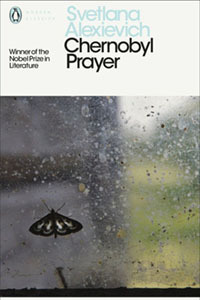
Chernobyl Prayer: Voices from Chernobyl
by Svetlana Alexievich
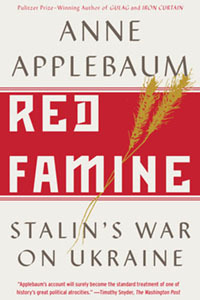
Red Famine: Stalin’s War on Ukraine
by Anne Applebaum
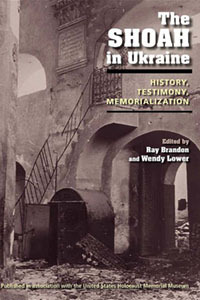
The Shoah in Ukraine: History, Testimony, Memorialization
Edited by Ray Brandon and Wendy Lower
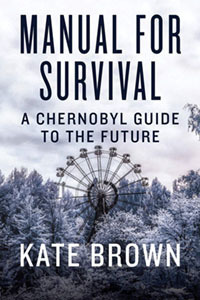
Manual for Survival: A Chernobyl Guide to the Future
by Kate Brown
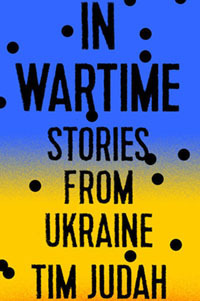
In Wartime: Stories from Ukraine
by Tim Judah
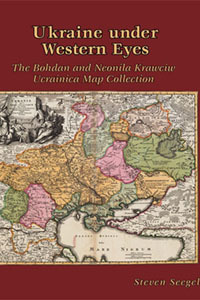
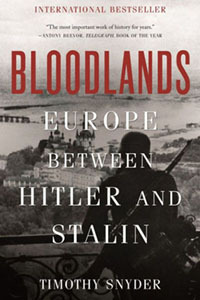
Bloodlands: Europe Between Hitler and Stalin
by Timothy Snyder
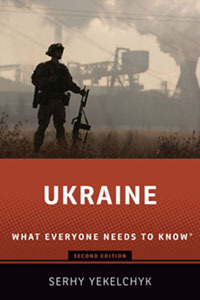
Ukraine: What Everyone Needs to Know
by Serhey Yekelchyk
